
Your law firm website cost should be viewed as an investment that turns into ROI
But that doesn't mean you should design a law firm website with 10k+ quotes.
So, the question is, how much are attorney website costs?
Typically, law firm website design costs around $1,000–$5,000 for a startup and mid-sized firm. And, the monthly attorney web cost ranges $500–$1000 for SEO, hosting, maintenance and security.
In this guide, you'll get to know the law firm’s website design pricing breakdown, strategic approach, website builder and hosting option and much more.
Average Cost to Build an Attorney Website: Quick Chart
The average attorney website cost is $2,000 – $6,000. But you shouldn't have to pay over $10,000 to build a law firm website.
Depending on firm size, design complexity, no of pages, development time, customization, website builder, hosting and maintenance cost, the monthly website cost varies.
Here's a clear breakdown of attorney website costs.
Solo attorney website cost
Solo attorney website cost ranges from $2,000– $3,000. As you need a website template without full customization.
Solo law firm websites have a monthly cost between $10 and $100 with hosting and ongoing expenses.
Small law firm website cost
Small law firm web cost starts from $3,000–$5,000 with semi-custom website design, branding, SEO and AEO features.
With SEO built-in features, implementing a marketing funnel, hosting and maintenance costs, you need to invest $100–$500 per month for a small law firm website.
Multi-attorney website cost
The cost of building a multi-attorney website typically ranges from $5,000– $7,000.
You must invest in a fully custom web design. The monthly expenses should be at least $500– $1,000 behind SEO/AEO setup, hosting and other expenses.
Law Firm Website Cost Breakdown
When creating a website, you have to build a law firm marketing plan first. The reason is that your law firm’s new website setup is driving the success of your professional online presence.
Web Design and Development Costs
Law firm website design and development cost is $1,000– $7,000 even sometimes 15,000+. It depends on the way you are willing to build a website.
Learn more about law firm website design cost and tricks to avoid overpaying
Template Vs Custom Law Firm Website Design
Template-based attorney website design cost $1,000– $3,000. The most popular option for solo practitioner attorneys is basic template sites.
Again, custom law firm website design cost $3,000- $5,000, best for small firms and mid-sized firms.
Well, small firms should go with a semi-custom design, which may cost $2,500– $3,000.
Freelancer VS Website Design Agency
Freelancer law firm web designer is a cheaper option, and more attorneys want to work with it.
It typically costs $1,000– $5,000. Often it costs more in future, as they don't understand the legal industry, ADA compliance, and security patches that lawyer websites must have.
Again, the most popular law firm website design agencies like Scorpion, FindLaw, and LawLytics quote seem to overpay for a $10,000– $15,000 website. Well, they provide high-end professional design, suitable for mid to large firms.
But, often their quotes make you locked–in contract and your high upfront investment cost increases.
For a solo and small law firm, you should choose a boutique law firm specialized agency like LegalPeel. It cost $2000– $5,000 for building an effective law firm web design for a solo and a small firm with SEO integration.
Functionality Costs
Automation or CRM software integration can cost around $300–$5,000 for the initial functional website setup. And, you may need to invest $40–$300 per month for a software subscription.
Basically, an attorney website should be conversion friendly that automates leads from booking a call to consultation.
Hence, most lawyers rely on automation workflows on websites. And for this, they choose Clio, PracticePanther, and MyCase.
Bonus: If your budget is tight, you can choose LegalPeel for integrating chatbots, payments, portal and automation tech software for solo and small firms.
Content and SEO Setup
The local SEO setup for law firms pricing ranges from $500-$1,000, including Google My Business, local practice area pages setup, and NAP consistency.
Additional law firm SEO pricing between $1,500–$2,500/month, including legal website content, on-page SEO, technical SEO and link building.
Common question: Will I need to integrate SEO into my website?
Even with massive mouth referrals opportunities, you need to integrate a local SEO setup if the budget is tight.
Law firm SEO service is crucial for a law firm’s online presence in local search and to get legal leads.
Law Firm Hosting Pricing and Ongoing Costs
Law firm hosting pricing is 0 to $500/month. How?
While you rely on the high-paying legal website and digital marketing agency, they would most likely lock you in a monthly contract for marketing strategy, security, maintenance and hosting costs.
Well, web hosting costs for law firms is $50–$200/ per month.
But, here's the free law firm web hosting pricing version– Webflow.
No need to hire a website maintenance service or backup security patches.
Webflow has built-in features and a free hosting plan in its Webflow CMS pricing.
However, we have built over 55 Webflow websites for law firms, and the clients only pay once for website development.
Factors Influencing Attorney Website Cost
How much attorney websites cost does not have a definite answer. Because you have to consider so many factors to reveal the website's overall cost.
1. Website Builder Platform
The DIY website builders you are using for a lawyer website ultimately influence the cost.
The most popular web builder options for law firms are Webflow, WordPress, Wix, and Framer. And, legal-specific website builders are Clio and LawLytics.
Webflow is the best option overall as it has hosting, maintenance and security built-in features. So, your monthly maintenance cost can be minimized.
2. Design Complexity
Custom attorney website design is higher than that of a general website design and template-based website.
The more you need custom code, functionality, and integration, the more you have to invest.
3. Number of Pages
Most solo lawyers prefer one page law firm web design
Again, a multi-attorney website must have attorney profile pages, a few practice area pages, blog, and a contact us page. So, here are the pricing differences.
4. SEO and Content Creation
Search engine optimization and legal blog content writing services add $500-$2,000/month.
Or, your startup can launch a website with basic local SEO fundamentals that are essential. It costs less
5. Online Portal and Advanced Features
Mid-size firm websites integrate CRM, lawyer, online portal, payment processors, forms, chatbot and advanced functionality increase additional cost.
6. Firm Size
No doubt, the law firm size exactly influences the cost.
While running a solo law firm, you shouldn't invest more. Whereas, mid and enterprise law firm professional website costs more.
LegalPeel's Tired Pricing Model for Law Firm Website
LegalPeel’s tiered pricing makes it easy for law firms to start smart with their website and scale confidently as they grow.
1. Starter Package
Average cost: $1,500–$2,500
What's included
- Basic Webflow website design
- Local SEO Setup
- Google business profile optimization
- Contact form and chatbot integration
2. Authority Package
Average price: $2,500– $3,500
What's include
- Custom website design
- Full SEO and AEO setup
- Practice area structure pages
- Branding files
3. Growth Package
Average cost: $3,500– $4,500
What's include
- Custom Webflow Website
- SEO and AEO structure
- Google My Business profile optimisation
- Branding and marketing materials
- Scalable CMS pages
- CRM and functionality setup
[[inner-cta]]
Final Words
So how much are attorney website? The cost is what you need, what you expect, and what chisen website agency delivered to you.
Most lawyers regret a 10k+ website with a long-term contract trap, no ownership, and no data security.
That's why hiring a website design agency is crucial.
At LegalPeel, we handed over Webflow web design for lawyers, including full ownership, control and accessibility.
Want a branded law firm website for your solo practice or small firm?
[[last-cta]]

Finding new clients in the U.S.A. legal market isn’t easy. Competition is suffocated, and traditional advertising doesn’t cut it anymore.
That’s why law firms need you for their lead generation if you are a legal professional.
Top agencies blend sales and marketing expertise with data-driven marketing efforts to bring you every qualified potential lead.
In this guide, we’ll reveal the top U.S.A. legal lead generation companies and how they can transform your firm’s growth in 2026.
What Are Legal Lead Generation Companies?
Legal lead generation companies are specialized marketing agencies that help law firms attract clients through:
- SEO and local search optimization
- Pay-per-click (PPC) advertising
- Content marketing and blogs
- Client intake systems
Their goal is to provide consistent, high-quality leads, allowing attorneys to focus on practicing law rather than chasing prospects.
What services do legal lead generation companies offer?
Finding new clients isn’t easy, especially in competitive markets like the U.S.A. That’s where lead generation companies come in. Their job is simple: bring you qualified leads or clients so that you can focus on closing deals. Here’s how they do it.
1. Email Marketing
They send targeted email campaigns to prospects. These emails share useful content, offers, or reminders that move people closer to becoming clients.
2. Social Media Ads
Companies run ads on LinkedIn, Facebook, and Instagram. With advanced targeting, they reach people by location, age, profession, or interests, so you get the right leads.
3. Search Engine Optimization (SEO)
By optimizing websites with the right keywords and content, they help businesses rank higher on Google. More visibility means more organic leads without paying for every click.
4. Pay-Per-Click (PPC)
PPC ads place your business at the very top of search results. You pay only when someone clicks the ad, making it a fast way to get leads in the U.S. market.
5. Webinars and Events
Hosting online webinars or virtual events is another proven method. Attendees sign up with their details, giving you high-quality leads who have already shown interest.
6. Inbound Marketing
This is about pulling clients in naturally. Lead generation companies create blogs, eBooks, and guides that answer real customer questions. When people search for solutions, they find your business.
To learn and better dive into it here.... law firm lead generation
Why is hiring a lead generation company a must for you?
%20(1).webp)
Benefit 1: Reach the Right Clients
Targeted Marketing: Instead of advertising to everyone, legal lead generation companies utilize tools such as Google Ads, SEO, and local search to reach individuals who are actively seeking legal assistance.
Know Your Ideal Client: They study your practice area and location to connect you with clients who really need your services, so your marketing works smarter, not harder.
Benefit 2: Save Time and Energy
Streamlined Process: Agencies take care of ads, campaigns, and follow-ups, so you don’t have to waste time chasing leads that may never convert.
Focus on Law: This frees up your time to concentrate on cases and clients, instead of marketing tasks.
Benefit 3: Expertise in Legal Marketing
Best Marketing Strategies: From SEO and Google Ads to content and social media campaigns, these agencies know what works to bring in high-quality leads.
Use of Data: They track every click, call, and form submission to improve campaigns and get better results over time.
Benefit 4: Save Money
Cheaper Than In-House: Hiring a full in-house marketing team can be costly. Agencies usually provide better results at a lower cost.
Flexible Options: Many agencies offer you pay per lead, with a monthly plan, or based on performance, so it fits your budget.
Benefit 5: Better ROI (Return on Investment)
Track Success: Agencies monitor leads, conversions, and ROI, so you know what’s actually working.
Adjust Quickly: They tweak campaigns in real-time to get the best results and avoid wasting money.
[[inner-cta]]
Best Lead Generation Companies in the USA 2026
1. LegalPeel - Law Firm Lead Generation & Web Design Agency
%20(1).webp)
Type of Service: Lead Generation + Digital Marketing for Law Firm
Overview:
LegalPeel specializes in helping U.S. law firms attract and convert more clients through data-driven lead generation and high-converting websites. With expertise in legal marketing, automation, and branding, they deliver measurable results that enhance long-term growth.
Core Services:
- Lead Generation for Law Firms: High-intent, qualified lead targeting via SEO, PPC, email, and social ads.
- Social Media Marketing: Platform-specific strategies for Facebook, Instagram, and YouTube.
- Email Outreach Campaigns: Personalized funnels to nurture and convert prospects.
- Landing Page Optimization: Tailored, conversion-focused pages to maximize client acquisition.
- Legal Web Design & Branding: SEO-friendly, mobile-responsive websites with full brand identity design.
- CRM Integration & Analytics: Funnel automation, tracking, and transparent performance reporting.
Pros:
- Legal Industry Specialists: 100% focused on law firm growth strategies.
- High-Intent Lead Targeting: give the high-intent legal lead that deliver result
- End-to-End Solutions: From websites to funnels and ongoing campaigns.
- Fast Turnaround: Websites built in as little as 2–3 weeks.
- Strong Client Support: 30 days post-launch support, plus long-term partnership.
Book a free lead generation and marketing strategy call. Contact Now
Pricing:
High-Value Case Accelerator Package:
- Advanced SEO + digital marketing strategy
- Retargeting & conversion funnels
- Comprehensive lead generation & case acquisition
- Mobile-friendly, conversion-optimized website
Contact LegalPeel for any kind of service & consultation
2. CIENCE - B2B Lead Generation & SDR Agency
.webp)
Service Type: B2B Lead Generation Agency
What They Do:
CIENCE provides SDR-as-a-Service, helping B2B companies book meetings through outbound, inbound, and enterprise-level campaigns. They combine AI tools with human research to reach the right decision-makers.
Key Features:
- Dedicated SDR teams for lead generation
- CIENCE GO platform for data, intent, chat, and digital outreach
- Custom go-to-market and omnichannel outreach strategies
Why Choose CIENCE:
- Ranked #1 B2B Lead Generation Company on Clutch (2022)
- Trusted by 2,500+ companies worldwide
- Offices in the USA, Brazil, Germany, and Uganda
Pricing:
Custom pricing based on campaign size and goals
3. Belkins - Omnichannel B2B Lead Generation Company
.webp)
Service Type: B2B Lead Generation Agency
What They Do:
Belkins focuses on booking qualified meetings using email, LinkedIn, calls, and multi-channel outreach.
Key Features:
- Appointment setting with decision-makers
- Cold email and LinkedIn lead generation
- Omnichannel campaigns (email, calls, LinkedIn, SMS, ads)
Why Choose Belkins:
- 100–400+ qualified appointments per year
- Works with 1,000+ companies across 50+ industries
- Highly rated on Clutch, G2, and Stevie Awards
Pricing:
Custom quotes based on business size and outreach scope
4. The Builders Agency - USA-Based Digital Marketing Agency
.webp)
Service Type: Full-Service Digital Marketing Agency
What They Do:
The Builders Agency helps local and small businesses grow online through SEO, web design, advertising, and content creation.
Key Features:
- Local SEO and keyword optimization
- Custom, mobile-friendly website design
- PPC campaign management
- Social media and content marketing
- Video and drone production services
Why Choose Them:
- Strong focus on local businesses
- Affordable and transparent pricing
- Known for creative design + SEO balance
- Highly responsive and personal service
5. PPC Expertz - Full-Service PPC & Digital Marketing
.webp)
Service Type: Digital Marketing Agency
What They Do:
PPC Expertz offers paid ads, SEO, website design, and branding under one roof.
Key Features:
- End-to-end PPC campaign management
- SEO and web development support
- Works across multiple industries
- Offices in Florida and New York
Why Choose Them:
- One-stop marketing partner
- Strong presence in major U.S. markets
- Ideal for businesses needing both ads and SEO
Pricing:
Custom pricing based on project requirements
6. Dominant Digitally - Full-Spectrum Digital Marketing
.webp)
Service Type: Digital Marketing Agency
What They Do:
Dominantly builds strategy-first marketing campaigns focused on growth, conversions, and transparency.
Key Features:
- Local SEO and PPC strategy
- Real-time dashboards and monthly reports
- Works across healthcare, eCommerce, and startups
- 24/7 communication in client time zones
Why Choose Them:
- Transparent reporting
- Fast, responsive team
- Flexible across industries
7. LevelUp Leads - B2B Lead Generation & SDR Outsourcing
.webp)
Service Type: B2B SDR & Appointment Setting Agency
What They Do:
LevelUp Leads offers fractional or full SDR teams to help companies book meetings without building in-house sales teams.
Key Features:
- Cold calling, email, and LinkedIn outreach
- GTM strategy, list building, and sales enablement
- Dedicated campaign team per client
Why Choose Them:
- Saves $125K–$150K vs in-house SDRs
- Fast onboarding (7–10 days)
- Highly rated on Clutch and G2
Pricing:
Custom pricing
3-month minimum, then month-to-month
8. BlueHat Marketing - Premier Digital Marketing Agency
.webp)
Service Type: Digital Marketing Agency
What They Do:
BlueHat Marketing delivers SEO, PPC, social media, and web development for businesses across North America.
Key Features:
- SEO, paid ads, influencer marketing
- Website development across all major platforms
- Google-certified marketing professionals
- Data-driven campaigns
Why Choose Them:
- 17+ years of proven results
- Ranked millions of keywords
- Offices in Canada and the USA
- Recognized by Clutch and Semrush
Pricing:
Custom pricing based on scope and goals
9. Callbox - AI-Powered B2B Lead Generation
.webp)
Service Type: B2B Lead Generation Agency
What They Do:
Callbox combines AI technology and human outreach to drive leads through voice, email, LinkedIn, and web channels.
Key Features:
- SMART Engage AI platform
- Account-based and event marketing
- Global campaign execution
- Outsourced SDR services
Why Choose Them:
- 20+ years of experience
- Served 15,000+ companies
- Subscription-based pricing
- Recognized by G2 and Clutch
How much should I pay for legal lead generation services?
Important Note:
CPL varies based on location, competition, lead exclusivity, and screening quality.
Final Insight:
In this jurnal we share different things like agency details thei pricing, and why you need to hire a lead generation company for your law firm.
So, Legal lead generation companies play a crucial role in helping law firms acquire new clients efficiently and effectively. By understanding the core benefits and evaluating the top companies in the USA
Ready to turn your website and marketing into a reliable clien acquisition engine?
[[last-cta]]

Building a small law firm website is often overwhelming. You need to calculate your budget, choose between templates or a custom design, find an easy-to-edit CMS, and handle many other decisions.
Meanwhile, finding the best small law firm website for inspiration is also crucial.
We’ve combined insights from 10 award-winning website designs for small law firms. This guide covers essential law firm UX best practices, CTA placement, branding, and the must-have pages to build a lead-generating website.
So you can outrank established law firms without massive resources or high-budget law firm marketing investments.
Key Features of High-Converting Small Law Firm Websites
Solo and small law websites should feature clear copy, branded colors, contact pages, conversational CTAs, clear attorney headshots, and areas of law practice pages.
Clear Value Proposition
Your law firm website should instantly explain 3 questions. Who you are, who you serve, and why they should choose you.
Consistent Branding
Integrates law firm branding, strong messaging, clear spacing and typography that signals clarity and establishes credibility
Mobile-friendly and Responsive Design
Mobile-friendly layout and a responsive website are crucial to enhance clients' experience and capture legal leads efficiently.
Fast Loading Speed and SEO Optimized Structure
Use an easy-to-edit CMS that ensures the fastest speed with basic SEO features. So, your prospective client will stay and engage without frustration.
Strong and Visible CTA
Strategic CTA placement that is highly visible and encourages prospective clients to take action.
Easy to Find Contact Information
Display phone numbers, consultation booking, and contact forms above the fold. Include office location maps, email addresses, live chat, and case evaluation forms to capture high-intent leads.
Client Testimonials and Case Studies
Show expertise and build authority with client testimonials, case studies and real results showcase.
Bonus: Dive into the must-have features every small law firm website should have. So, you don't miss important conversion elements.
Top 10 Small Law Firm Website Examples
Here are the top picks for small law firm websites of 2025 and inspiration from the 300+website list. Each website generates over 2k visitors per month. Let's note down the design inspiration from the following list.
1. Barlit Beck LLP
.webp)
Barlit Beck is a boutique law firm, specialized in litigation practice.
Their website instantly establishes trust and authority with clearly showcased awards, client reviews and client alignment on the homepage.
A clear menu navigation that emphasizes why, what and who they are, with contact information, is smart UX.
They don't have unnecessary pages that really matter for a small law firm website.
2. Bird Marella
.webp)
Bird Marella is a strong small law firm website with a clean design and structured content.
The minimalist layout, refined typography, and generous white space reduce cognitive load and help visitors quickly understand the firm’s positioning.
This small law firm’s website features a clear practice area page, easily navigates attorney profiles and connects to Google Maps for easy contact.
3. Hobert Law
.webp)
Hobert Law's website is another conversion-friendly best legal website example.
Their direct and problem-centered hero section clearly defines the firm's focus on nursing home abuse cases.
They added a phone number in the heading and a second CTA for free consultation. That means a legal lead can easily contact them instantly after understanding their expertise.
Detailed attorney profiles with clear headshots and blended brand colors across all the sections are really impressive.
4. Mike Hostilo Law Firm
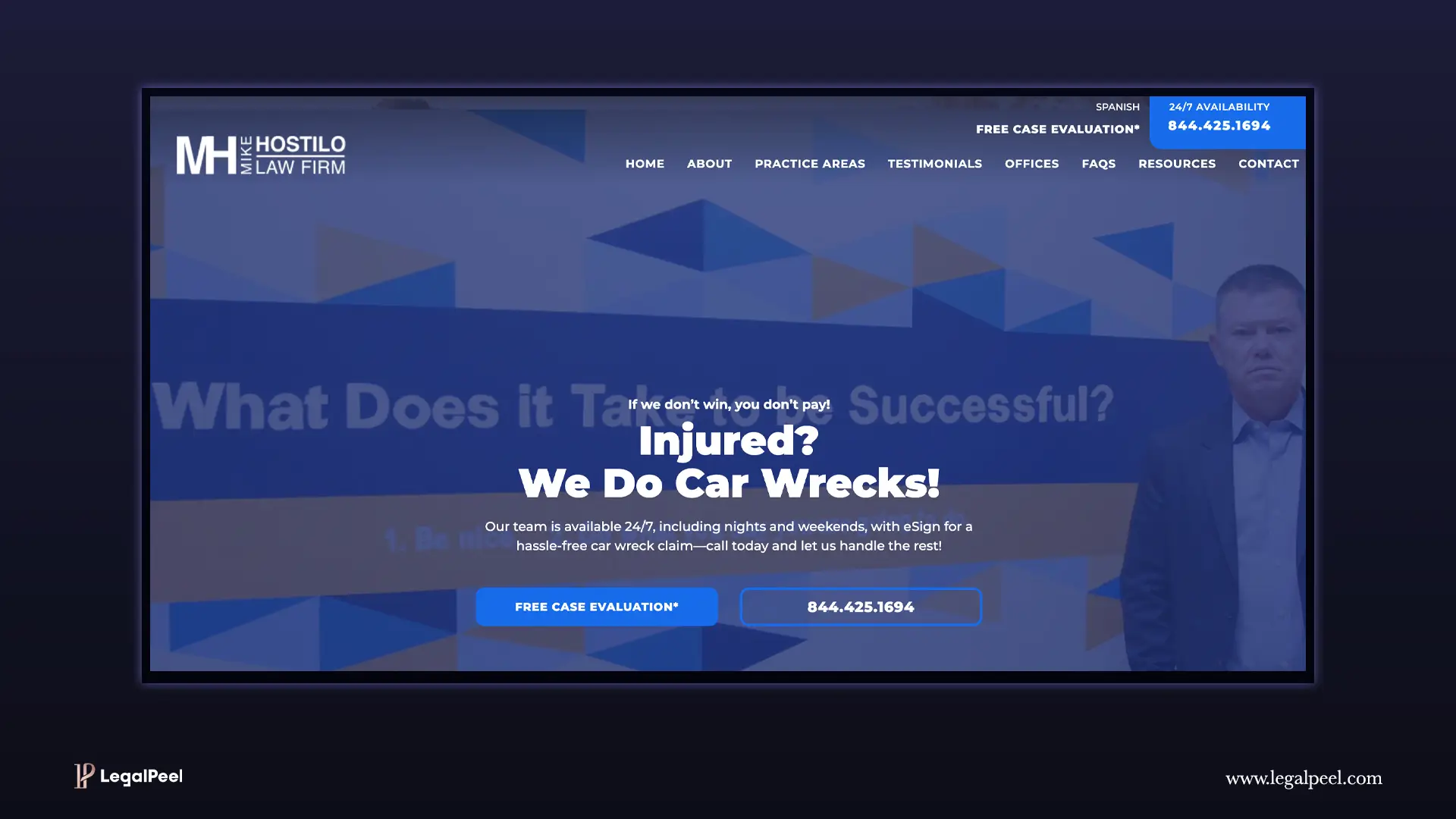
Mike Hostilo is the best personal injury law firm website for small firms.
Introducing the hero section with a strong risk reduction statement—“if we don't win, you don't pay”—instantly builds trust.
This site has a strong hero copy that directly engages potential clients with questions about injuries. Good law firm website UX with strong copywriting styles which increase case acquisition.
Their UX conversion hits for phone number and free case evaluation displays in the hero section. Plus, they use a chatbot, which is what a great attorney website should implement.
Mike Hostilo's law firm integrates its brand colors, tone, and typography consistently across all website designs.
5. Thrift McLemore
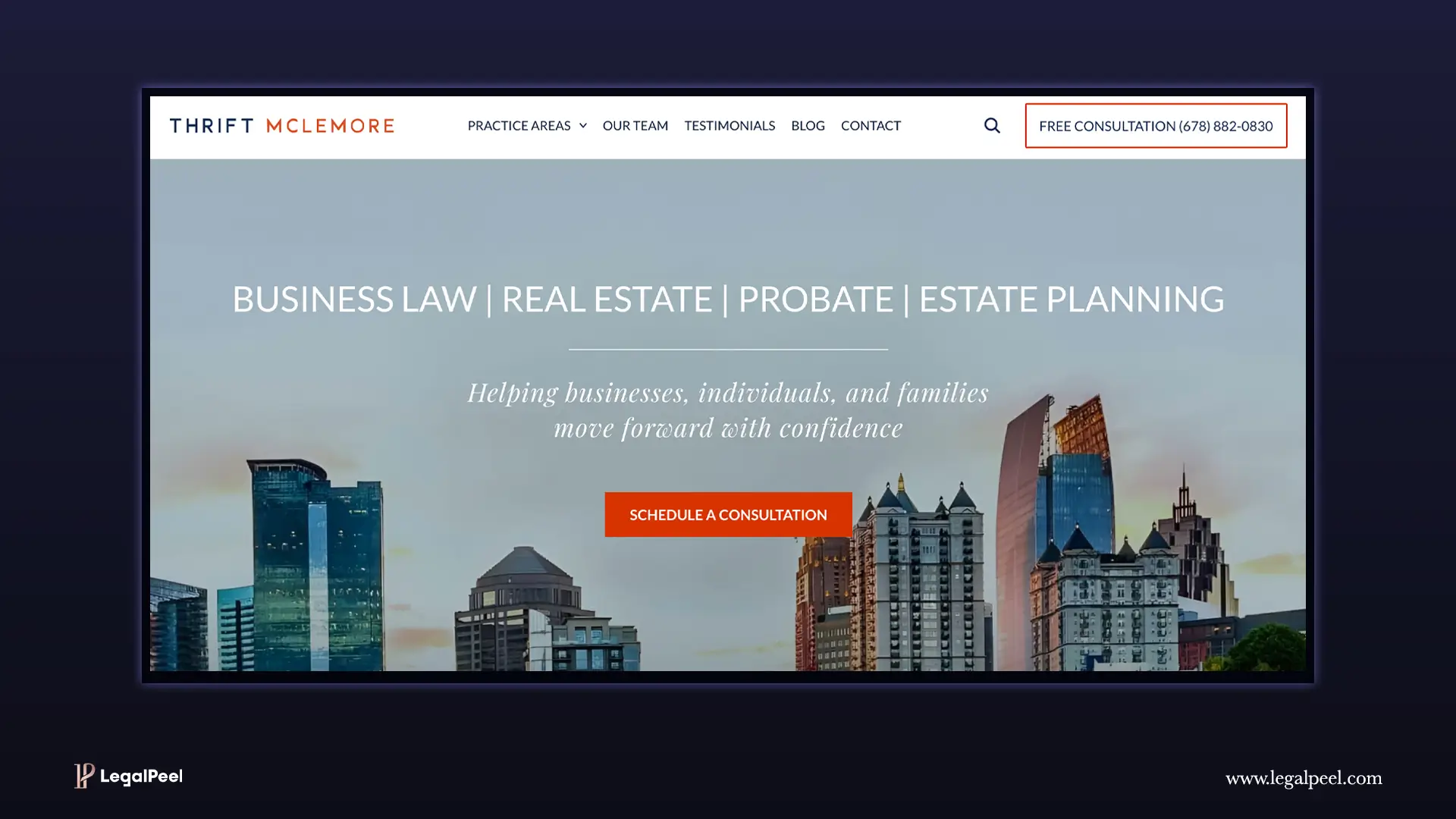
Thrift McLemore is a sample lawyer website example to strengthen your small law online presence.
Their website features only important sections on the homepage, like hero sections, ratings and reviews, clear practice areas, and testimonials.
Thrift McLemore presented a clear value proposition in the hero copy that they serve estate planning, business law and real estate.
With essential pages like contact us, testimonial, blog, practice area, service segmentation, Thrift MC Lemore directly targets users and dominates SEO as well.
Also, they have separate attorney profiles with professional headshots.
Bonus : Don’t know how to budget for your law firm? Read guide on law firm website design cost and avoid overpaying for small firm site.
6. Bain Mazza & Debski LLP
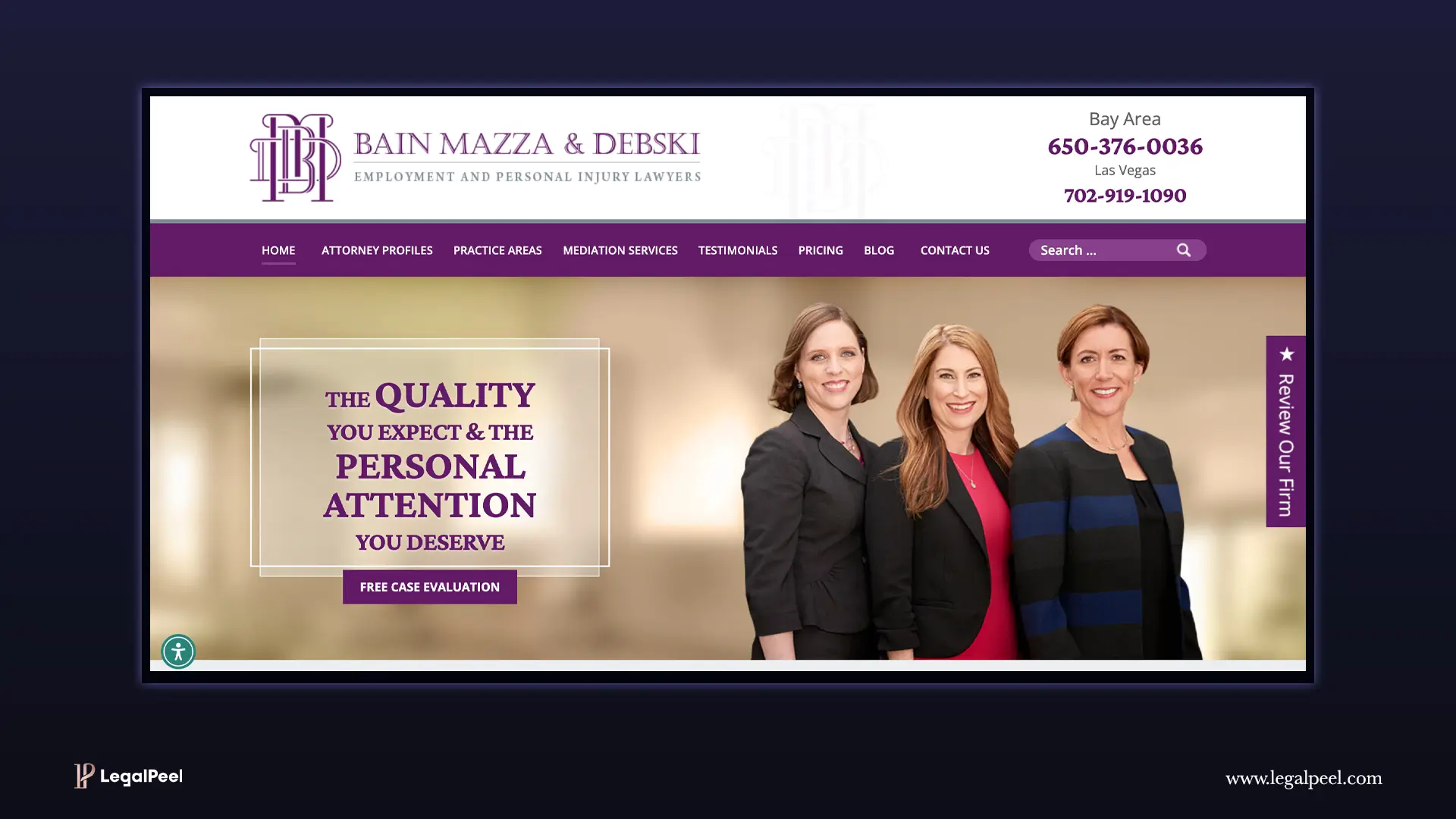
Bain Mazza & Debski LLP is a small law firm website inspiration for solo attorneys.
Only 3 attorneys are making their Bay Area law offices' online visibility a case-winning platform.
Bain Mazza and Debski LLP chose a very elegant brand color and built a modern lawyer website design.
Easy navigation bar in heading stands out for its focused positioning in employment law and personal injury, making it immediately clear who they serve. Practice area sections are labelled with common client concerns.
The site uses multi-location contact details and a persistent free case evaluation CTA to drive conversions at every turn.
Client testimonials deepen trust, while visible attorney profiles make the firm feel approachable and authoritative.
Strategically placed CTAs and clear information architecture support both user experience and lead generation goals.
Inspired by this website design? You can even get a more professional small law firm website with LegalPeel. Reach out to us.
7. Hoffman Law Group
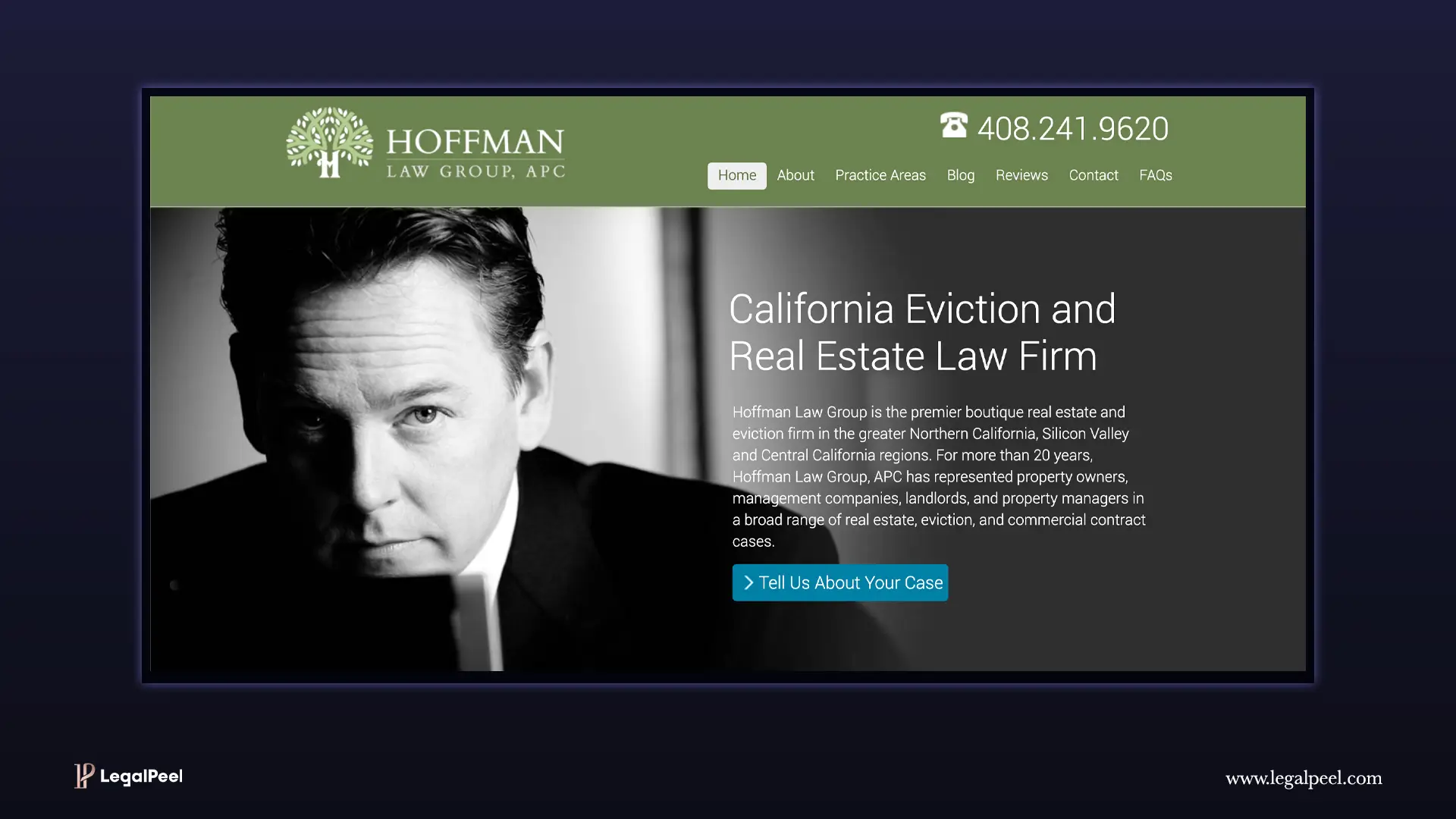
The Hoffman Law Group website serves as a focused and professional online presence for a specialized real estate and eviction law firm.
Contact information and location details are highly accessible, supporting direct engagement, while practice area segmentation helps visitors immediately find relevant legal solutions.
Strategic calls-to-action like “Schedule Your Free Case Evaluation” and click-to-call phone links help convert motivated local searchers into leads, making this site a strong example of UX-driven legal web design for a boutique firm.
8. Turnbow Law Firm
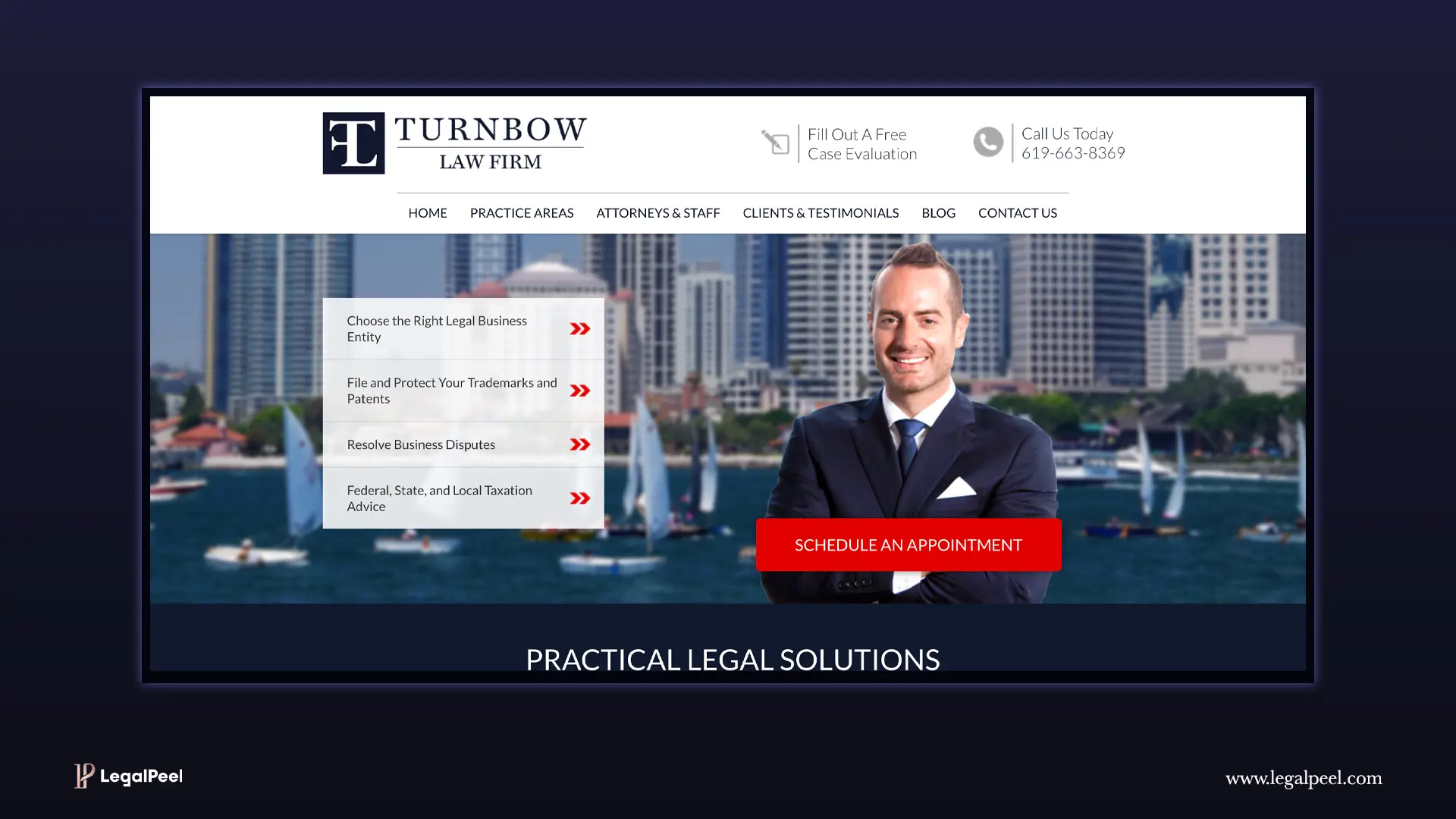
Turnbow Law Firm is one of the best websites for small law firms for its simple and intuitive design.
William Turnbow has an exceptional website with essential pages and clear attorney images for authority and trust.
Clear practice areas section, free case review and contact number on the hero section folder made contact easily accessible. It's the best strategy for lead generation through an attorney's website.
Turnbow and his paralegal are leading the small law office, and their website clearly defines that.
We’ve created professional solo attorneys website that improves local visibility from the first 60 days. If you're serious about website design, feel free to contact us.
9. Miller & McGing

Miller & McGing is one of the best attorney website designs for boutique law firms.
Their established attorney website design reflects how they represent professionalism with modern, branded websites.
A tagline right up front, "The Financial Compensation You Deserve”, gives clarity and purpose within seconds.
Simple navigation structure, multiple conversion paths, and strong testimonials with attorney experience make their firm more authoritative and professional.
10. Lieb and Lieb Law Firm
.webp)
Lieb and Lieb law firm presented a clear value proposition with 30+ years of experience at reasonable rates.
That means, legal leads searching for lawyers immediately can be convinced and contact with a visible phone number, free consultation, map address.
They show how they pay attention as boutique law firms to their clients throughout over website copy, branding and creative interfaces. Lieb and Lieb firm has only essential pages with a clean layout – A perfect boutique law firm web design.
Bonus: Explore 10+ best small and solo law firm website designs, including family law firm, personal injury law, employment, estate planning, and business law firms.
[[inner-cta]]
How to Build Your Small Law Firm Website
Build your small law firm’s website with the right website builder, mapping local SEO keywords and service pages, choosing semi-custom templates and maintaining ADA compliance.
Otherwise, your static website will no longer help you to generate potential clients.
Choosing the Right Website Builder Platform
You should choose a website builder platform first to create a law firm website.
The best website builder for a small law firm is Webflow, WordPress, Wix or Squarespace.
Overall, Webflow is the best option for SEO, faster speed, user-friendly CMS, security and compliance-ready law firm website.
So, if you need a website not only for visual appeal but also for conversion, you can go with Webflow.
LegalPeel builds 20+ custom Webflow websites for small law firms. And, each firm experiences higher SEO performance, better leads and ROI from the first 3months.
Custom vs Template-Based Web Design
Most small firms start with legal website templates to build law firm websites quickly and easily.
Template-based law firm websites are great for affordability. But choosing a semi-customized law firm website design at a budget is an effective way.
Essential Website Pages for a Small Law Firm
Fear of missing any important pages? As a small law firm, you should have basic pages with clear copy and intuitive interfaces.
You should include home, about, services, contact and blog pages in your new firm’s website.
SEO and Local Visibility Setup
Some law firm owners are thinking of creating websites without SEO for budget-conscious conscious. You may think the same.
Prioritize local SEO optimization setup with every service page and city+practice area pages from day one. It'll give you higher local visibility and legal lead generation.
Pro Tips: You can choose LegalPeel's affordable small law firm website design packages starting from $3k with SEO optimization.
Launch a Small Law Firm Website Without Fear
Don’t lock yourself into a high-budget website contract that doesn’t make sense for a small firm. At the same time, relying on a DIY template website can damage your first impression and weaken your firm’s credibility.
You need essential pages, smart branding, and a manageable CMS that works for both your clients and your marketing team.
Otherwise, you’ll face constant headaches —small updates becoming costly, inflated fees, and little to no real results.
Get rid of the fear.
If you're looking for a custom lawyer website built with 2026-ready features, essential pages, smart UX, SEO and strong branding at an affordable price, we can help.
Reach out to LegalPeel today.
[[last-cta]]

Why a Powerful Website Matters for Solo Lawyers
This is the best guide for you if you are a solo lawyer looking to make a significant impact on your solo law firm website. Then, this guide will be the best place for you to gain a clear understanding.
We are moving forward with it. The basic things that must be included in your small law firm website design, branding, and essential SEO terms. This blog takes you to the next step to make an enthusiastic result on your law firm's website.
And there’s one important question you need to answer:
Is your law firm’s website truly modern?
If not, don’t worry, we’re here to help and guide you through it.
Why Solo Law Firm Websites Fail: Design, Branding & SEO
- Around half of law-firm websites aren’t mobile-friendly - Visitors leave before they even see your services.
- Approximately 25% of sites load too slowly, which can significantly reduce your chances of converting visitors into valuable clients.
- The average law firm website conversion rate is only around 2% - most traffic never turns into consultations.
- Many sites use generic images and weak branding, so potential clients don’t feel trust & credibility.(growlaw.co)
Most solo law-firm websites look unprofessional, fail to engage, and don’t get found easily. We have the solution for you, don't worry!
What are the best ideas for a modern design for a solo law firm?
Creating a standout website as a solo lawyer requires more than just a professional look; it needs to engage visitors, build trust, and make your services easy to access.
.webp)
Here are the key ideas for a modern, effective small firm website design :
- User-Centric Design
Focus on your visitors’ needs. Make it easy for potential new clients to find information, understand your services, and contact you quickly. - Perfect UI/UX
A clean, intuitive interface ensures a seamless experience. From buttons to forms, every interaction should feel natural and professional. - Easy Navigation
Structure your website so visitors can smoothly move between pages. Clear format and logical layouts reduce frustration and improve engagement. - Top-Class Modern Design
Use a unique style that reflects your expertise and professionalism. Minimalist layouts, maintain typography, and consistent branding create a premium look. - Responsiveness
Your site must adapt perfectly to desktops, tablets, and mobile devices. A responsive design improves user experience and first impression - Mobile-Friendly Experience
With most users browsing on phones, prioritize mobile usability. Fast loading times, readable text, and touch-friendly buttons are essential. - SEO- Friendly Structure
Optimize your content, headings, and meta title to rank higher in search results. This increases visibility for people searching for solo lawyers on Google.
What are the Best ideas for branding for a solo law firm?
.webp)
Your solo law firm website is more than just a platform to showcase services like a Miroor. It’s a reflection of your personal brand. Strong branding builds trust, attracts clients, and sets you apart from competitors. Here are the best ideas for branding a solo law firm website:
- Create a Perfect Logo
Your logo is the face of your firm. Make it professional, memorable, and reflective of your values. A strong logo builds recognition and credibility. - Use High-Quality, Original Imagery
Authentic photos of yourself, your office, and client interactions add a personal touch. Avoid generic stock images to make your website stand out. - Communicate Your Brand Story
Share your mission, values, and expertise. Let visitors understand who you are and why your services matter. A compelling brand story builds trust. - Engage Directly with Clients
Use interactive features like contact forms, chat options, or FAQ sections. Engaging content encourages potential clients to reach out. - Provide User-Friendly, Client-Focused Content
Focus on the needs of your audience. Clear, simple, and helpful content ensures visitors feel supported and informed. - Maintain a Top-Notch Website Design
A clean, modern website with intuitive navigation enhances your brand image and demonstrates professionalism. - Consistent Logo Colors & Typography
Stick to a defined color palette and font style across your website and materials. Consistency reinforces your brand identity.
Looking to level up your brand? Law Firm Branding Agency in the USA
What are the best ideas for SEO for a solo law firm website?
.webp)
If you’re a solo lawyer, having a great website isn’t enough. You need people to actually find it( within a second)! A smart SEO strategy helps your website appear in search results, attract the right clients, and grow your practice. Here’s how:
- Focus on Local SEO
Make it easy for local clients to find you. Mention your city and service areas on your website and in your Google Business Profile. This ensures people can contact you quickly. - Use AEO (Answer Engine Optimization)
Answer common legal questions clearly on your website. AI search engines like ChatGPT, Gemini, and Perplexity prefer sites that give direct, helpful answers. - Geo-Target Your Content
Include location-specific keywords to ensure your content aligns with what local clients are searching for. You can also use AI tools to see how people ask questions about legal services in your area. - On-Page SEO Matters
Optimize each page with clear headings, meta titles, descriptions, and relevant keywords. Internal links help visitors explore your site and also boost search rankings. - Build Authority with Off-Page SEO
Get backlinks from trusted legal directories, local publications, and industry websites. Encourage happy clients to leave positive reviews for you, which creates credibility for you. - Don’t Forget Technical SEO
Make sure your website loads fast, is secure (HTTPS), mobile-friendly, and properly indexed. Structured data and clean coding help search engines understand your site better.
What is the best website platform for solo law firms?
If you want a professional website that looks modern, loads fast, and builds trust with clients from the first click, Webflow is one of the strongest choices you can make as a solo attorney.
Why Webflow stands out for law firms
No need to hire a full development team. Webflow converts your design into a high-end website visually, without dealing with complicated backend setup or endless plugins. You get complete creative control without the technical headaches.
The websites feel premium and polished. Webflow is ideal for creating clean layouts, sharp typography, and professional-looking pages, exactly what clients expect from a lawyer. This isn’t a generic template platform. It’s built for custom, branded design.
Speed and SEO are built in. Solo lawyers often rely on local search. Webflow helps with:
- fast load times
- mobile-friendly layouts
- clean code
- SEO Friendly
That means potential clients can find you and trust you more quickly.
Solo Law Firm: Modern Website Design(Checklist)
This guide is suitable for you if you want to make a modern website.
This will help: how-to-design-a-trust-building-solo-law-firm
Small Law Firm Branding(Checklist)
Solo Law Firm: SEO(Checklist)
Why is Local SEO important? If you haven’t optimized it yet, keep reading.
Final thought:
This guide is the full journey about the modern design and branding of your law firm and solo law firm you have. If you run a website in 2026, as a lawyer, Legal professional, or solo law firm owner, you must fulfill all the requirements (modern design, seo, branding).
To maintain all the things is not enough to make you own hand so you need a helping hand to do with. We are LegalPeel, the helping hand for you, an agency, a perfect combo solution for you.
Take our law firm website design service, built for trust, speed, and leads →
.png)
Your Law Firm’s Website Should Be Your #1 Rainmaker
Are you proud of how your law firm looks online? In a world where 78% of legal clients start their search on Google, your website isn’t just a digital business card, it’s your firm’s most powerful marketing asset. If your current site feels outdated, generic, or just isn’t bringing in leads, you’re losing clients to firms with better digital presence.
A high-converting, SEO-friendly website is essential for U.S.A. law firms. Effective legal website design and law firm website design should focus on turning visitors into consultations. This guide will help you know how.
Why Best Legal Website Designs Matter in 2025
Post-2024 Client Expectations
Today’s clients demand instant access to information. After 2024, 78% of prospective clients research firms online before contacting them. A poorly designed site can cost your firm credibility.
First Impressions Are Now 100% Digital
Your website is often the first place you interact with clients. Research shows users judge a site’s trustworthiness in 0.05 seconds. A cluttered or outdated design risks losing leads to competitors.
Data-Driven Credibility = More Retained Clients
Sites with straightforward navigation and professional visuals see 40% longer engagement. Include trust badges, certifications, and client testimonials to reinforce authority.
The Best Legal Website Design Services
(Tailored. Strategic. Built to Convert.)
A well-built law firm website should do more than look good , it should work as a digital client acquisition system.
Here’s what that means and how it works.
Custom Website Design: Clean, fast-loading designs that reflect your practice area and drive client inquiries.
Strategic Branding: From colors and fonts to logos and messaging, we shape a memorable, professional identity for your law firm.
SEO & Legal Content Optimized site architecture + localized keywords = more visibility on Google and more qualified traffic.
Lead Generation Campaigns We run paid ads, email outreach, and legal marketing funnels to attract and convert more leads from day one.
What Are the Best UX and Conversion Practices for Law Firm Websites?
- Sticky Contact CTAs on every page
- Short, high-converting forms (with optional live chat)
- Mobile-first design for today’s on-the-go clients
- Client reviews, trust badges & results are displayed prominently
- ADA-Compliant to ensure accessibility and protect your firm legally
[[inner-cta]]
Why Strong Law Firm Website Design Matters
Law firms and legal platforms need more than just attractive websites; they need digital platforms that actually generate revenue. Understanding what makes a law firm website successful can help you make smarter decisions for your practice.
What Law Firms Gain from a Well-Designed Website
- More qualified leads driven by targeted traffic and user-friendly layouts.
- Higher client trust thanks to strong branding and seamless user experience.
- Improved Google rankings with SEO tailored for legal search terms.
- Increased conversions through strategically placed forms, client reviews, and trust signals.
- ADA compliance to protect your firm legally and promote inclusivity.
What Sets an Ageny like LegalPeel Apart:
- 100+ successful law firm websites launched
- Dedicated legal SEO and design experts
- Full-service marketing + branding under one roof
- Transparent pricing, fast timelines, real results
- Benefits You Can Expect
- More Leads from targeted traffic and smart layouts
- Increased Client Trust with strong branding and UX
- Better Google Rankings through legal-focused SEO
- Conversion Boosts from forms, reviews, and proof elements
- ADA Compliance for legal protection and inclusivity
SEO-Friendly Law Firm Website Design Tips
1. Mobile-First & Fast
Most clients find you on their phones. Make sure your site loads fast and looks great on every device.
2. Easy-to-Navigate Structure
Keep things simple. Clear menus and organized pages help visitors (and Google) find what they need fast.
3. Local SEO Wins
Create pages for each location you serve. Add Google Maps to your contact page and keep your business info consistent everywhere online.
4. Build Trust
Showcase client reviews, awards, and badges. Add strong CTAs like “Schedule a Free Consultation” or “Call Now” on every page to drive action.
Custom vs Template-Based Web Design for Law Firms
Benefits of Best Law Firm Website Design:
- Increased Client Trust – A clean, professional website reassures visitors that your firm is legitimate and credible.
- Mobile Accessibility – Reach clients on the go with a responsive design that works on all devices.
- Improved SEO Performance – Fast-loading, keyword-optimized pages rank higher and attract more visitors.
- Higher Conversion Rates – Clear CTAs and contact forms turn visitors into leads.
- Enhanced User Experience – Easy navigation and smart structure keep users engaged and informed.
- Compliance and Accessibility – Meet ADA standards to avoid legal risks and serve all users equally.
[Book Your Free Website Strategy Call Today]
Final Thoughts: Legal Website Design That Works in 2025
A strong legal website design is essential for a law firm’s website to grow in 2025. The best legal websites are fast, mobile-friendly, thoughtful design, and are built to earn trust and generate leads. Whether you're looking for a legal, modern design website, a fully custom legal website design, or an affordable legal website design option, your site should reflect your professionalism and make it easy for clients to take the next step. Invest in the best law website designs to stay ahead, or partner with a team that specializes in website design for legal firms to get it done right.
[[last-cta]]
%20thumbnail.png)
Imagine this: A potential client searches for a lawyer. They find your site. In less than 5 seconds, they’ve formed an opinion, not about your skills, your courtroom success rate, or your credentials, but about your website.
In the modern world, your powerful website is the backbone of earning more clients. So, not only is it limited to other professions, but it is also essential for law firm owners. So, if you have a perfect website, then you are king in the competitive marketplace.
Sound harsh? It’s reality. Studies show that 75% of users judge a law firm’s credibility based on its website. And in 2025, when 450,000+ legal service searches happen every month.
Is Your Law Firm Website Costing You Clients?
If your website looks outdated, loads slowly, or isn’t optimized for mobile, it’s not just an aesthetic issue, it’s a business liability. In 2025, clients are judging your firm within seconds of landing on your homepage. You need a top law firm website that builds trust, ranks in Google, and turns traffic into leads.
Here’s the Cold Truth
- Are you getting traffic but barely any calls?
- Low conversions from traffic?
- Is your site buried on page 3 of Google?
- Do you hesitate before sending someone your URL?
These 10 Legal Website Design Agencies Fix Fast
- SEO-optimized for your practice area + location
- ADA-compliant and mobile-first
- Built for conversions, not just looks
- Secure, fast-loading, and fully managed
- Speed, Security, & Scalability
1. LegalPeel

Location: Atlanta, GA 30341, United States
LegalPeel is one of the most iconic agencies for Legal website design services. This agency gives services to a lot of law firm web design clients. To make a 100% responsive website for (PC, Mobile, Tablet), good recognition for legal web design.
Precision Services for Legal Professionals
Website Design Built to Convert
Responsive. Sleek. Intuitive. LegalPeel designs digital experiences that don’t just inform, they persuade. Whether on desktop, tablet, or mobile, users get a seamless experience designed to guide them to one clear action: contact.
Branding & Visual Identity That Speaks Without Words
A first impression happens in seconds. LegalPeel creates visual branding that communicates strength, trust, and professionalism before a single word is read. From bold logos to cohesive color systems, every element is calibrated to elevate perception.
Legal Funnels & Lead Generation Systems
Not all clicks are created equal. It builds high-converting funnels that guide visitors from curiosity to consultation. It’s not just about getting traffic, it’s about turning that traffic into paying clients.
SEO & Digital Marketing for Law Firms
LegalPeel delivers legal-focused SEO campaigns and digital marketing systems designed to dominate local search, capture attention, and keep firms front and center where it matters most.
Why LegalPeel Is Number One?
This Isn’t Just Web Design. This Is Client Acquisition, Engineered.
We create digital firepower fast, persuasive, and obsessively optimized to convert.
That’s where LegalPeel steps in.
We don’t just build websites.
We build momentum.
With over 100+ high-performance legal sites launched, we know exactly what works and what doesn’t in your industry. From strategy and branding to SEO, UX, and lead generation, we design every element to drive client acquisition.
Here’s what sets us apart:
- Fast-loading, mobile-first websites that convert
- Branding that builds trust before a word is read
- Legal SEO that gets found and chosen
- Conversion-focused funnels that turn clicks into consultations
- Transparent pricing, fast timelines, measurable ROI
[[inner-cta]]
2. PaperStreet
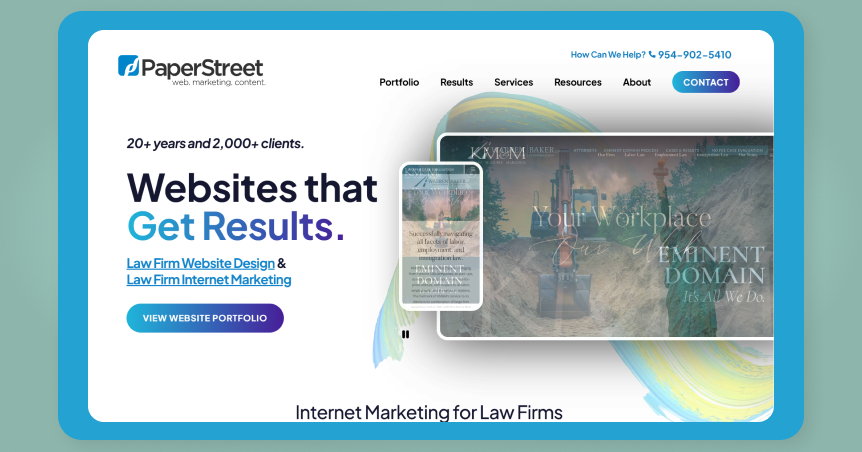
Location: Fort Lauderdale, Florida
Best For: Established firms seeking deep legal marketing experience
Key Services:
- SEO, PPC, and legal content development
- Branding and newsletter design
- Website hosting, ADA compliance, and maintenance
- Video production and podcast development
With over 2,000 law firm websites launched since 2001, PaperStreet is one of the most experienced agencies in the space. Their legacy of performance and comprehensive legal marketing services makes them a trusted partner for firms across a wide range of practice areas.
3. The Modern Firm
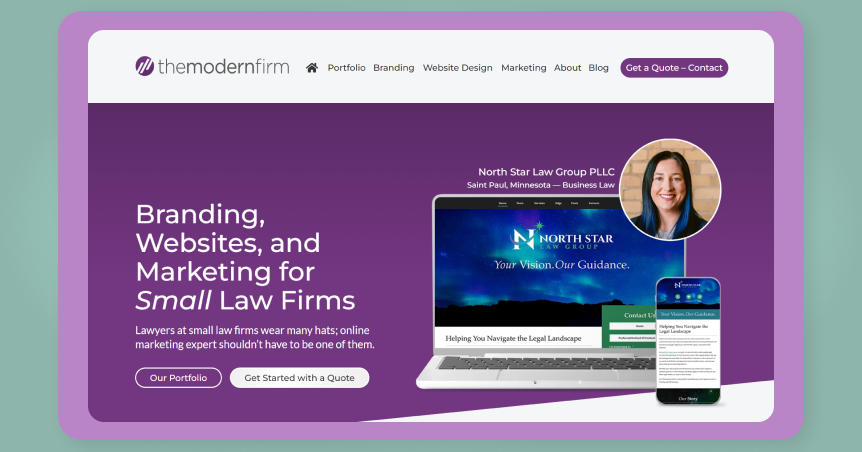
Location: Ann Arbor, Michigan
Best For: Solo and small law firms in need of fast, efficient execution
Key Services:
- Turnkey website packages
- Practice-area-specific design templates
- Logo design, copywriting, and hosting
- Website rescue and redesign services
The Modern Firm focuses on empowering small firms with professional, scalable web solutions. Their process is efficient, clear, and designed to deliver impressive results without requiring extensive involvement from busy attorneys.
4. Dan Gilroy Design

Location: West Linn, Oregon
Best For: Personalized service and 24/7 post-launch support
Key Services:
- Website and logo design
- Speed optimization and blog management
- Landing page development
- Ongoing support and attorney directories
Dan Gilroy Design has carved out a niche with its commitment to service and long-term relationships. Ideal for firms that value personal attention and dependable technical support.
5. Grow Law Firm

Location: Chicago, Illinois
Best For: Firms focused on growth and performance optimization
Key Services:
- WordPress and Webflow website development
- UX audits and conversion optimization
- A/B testing, branding, and SEO
Grow Law Firm delivers performance-driven design with an emphasis on analytics, testing, and ROI. Their tailored approach and robust growth strategies are particularly effective for firms operating in competitive markets.
6. Juris Digital

Location: Denver, Colorado
Best For: SEO-centric law firm websites on WordPress
Key Services:
- Search engine optimized content strategy
- Conversion-optimized design and landing pages
- Custom WordPress development
- Long-term lead generation strategy
Juris Digital integrates advanced SEO practices into every layer of the web development process. Their client outcomes consistently include increased organic traffic and significant growth in qualified leads.
7. Bizango

Location: Seattle, Washington
Best For: Boutique firms seeking storytelling and branding expertise, National law agencies design.
Key Services:
- Website design, logo creation, and graphic design
- SEO strategy and analytics implementation
- Content support and brand development
Bizango takes a creative-first approach with a strong foundation in digital strategy. Their ability to communicate a firm’s story while maintaining conversion integrity sets them apart from firms looking to differentiate.
8. Elite Legal Marketing

Location: Austin, Texas
Best For: Transparent pricing and performance-based design
Key Services:
- Website design and development
- Local SEO, PPC, and video marketing
- Social media and performance marketing
Elite Legal Marketing offers a rare value proposition: no payment until the homepage is approved. This client-first philosophy, combined with a focus on measurable growth, makes them a compelling option for firms that want results with accountability.
9. NinjaPromo

Locations: New York, London, Dubai, Singapore
Best For: Full creative and marketing support for larger firms or international practices
Key Services:
- Branding, UI/UX, and website development
- SEO, content, PR, and digital advertising
- Graphic design and ongoing support
NinjaPromo offers global scale and comprehensive creative solutions. Their law firm clients benefit from a multi-channel approach that includes public relations, paid media, and cutting-edge design execution.
10. Duck.Design

Location: London, England
Best For: Unlimited design support with a focus on UX/UI for legal websites
Key Services:
- UI/UX design and website development
- Landing page and motion graphic design
- Brand identity, infographics, and illustration
Duck. Design offers subscription-based design services, giving law firms access to a dedicated designer for a flat monthly fee. Their UX/UI experts craft conversion-driven legal websites and landing pages tailored to each practice area.
Final Thought
Your website is your most powerful tool for attracting and converting clients. Whether you’re looking for a full-service law firm website design agency, customizable law firm website design templates, or expert law firm website design services, choosing the right partner makes all the difference.
The best law firm website design companies understand what it takes to build trust, drive traffic, and turn visitors into leads. Even if you run a small law firm, a modern, mobile-first website can help you compete and win in 2025.
[[last-cta]]
.webp)
Your law firm website feels paused—no leads, low traffic, and weak case conversions.
That’s why website marketing is essential. The best web marketing strategies for lawyers are local SEO, branding, GMB profile optimization, PPC ads, and social media marketing.
With the right strategies, you can attract consistent traffic, capture qualified leads, and generate a higher ROI from every dollar you invest.
In this guide, you’ll learn how to choose and implement the right tactics based on your firm’s size and goals.
Why Website Marketing Matters for Lawyers
Web marketing for lawyers is an essential approach to increasing website visibility through free and paid advertising methods.
You have invested thousands of dollars in a beautiful lawyer website, but haven't seen any results yet. And law firm marketing got overwhelmed between PPC and SEO. Right?
What you are feeling frustrated with is:
- Poor leads conversion
- Low website traffic
- No case booked
- High advertising investment
- Seeing competitors grow
How law firm website marketing can fix it:
- Conversion-focused website with faster loading and clear navigation
- Claim a Google My Business profile to convert local clients.
- Build a Branded Law firm website to outrank competitors.
- Implement Local SEO Strategies to get local visibility.
- Website content marketing to increase website traffic
- PPC advertising with consistent analytics and reports.
Bonus: Read the step-by-step law firm marketing plan guide to success in 2026.
Essential Components of Law Firm Web Marketing
Website marketing works for attorneys only when you implement a data-driven strategy. Let's see how to grow your legal website.
1. Law Firm Website Design and Optimization
Conversion-focused website is a must-have tool for capturing law firm leads 24/7 by showcasing expertise and building trust.
Your law firm website design needs to clearly present contact information, CTA, client testimonials, and practice areas you have expertise in.
And optimize your website with faster speed and mobile responsiveness so clients can reach out to you without frustration.
As an example, Prospect- injured in a car accident, will search first for a personal injury lawyer near me in Google, rather than search for billboards or law courts.
So, does your website feel trustworthy and conversion-friendly?
If no– law firm website redesign is the first step to do.! Either your competitors will get the leads that you pay for.
2. Law firm SEO
Law firm website SEO is a cost-effective way to increase website traffic and client acquisition.
But, yeah, it's a longer-term game than Google Ads or PPC. Your attorney's online advertising can go in vain, but investing in an law firm SEO service won’t.
A survey revealed 87% of people are likely to search Google for legal help first.
So, your website should rank on page 1 of a search engine. Is it difficult? It takes time!
But local SEO for law firms is the fastest way to capture leads and convert them.
Optimize your practice area pages for local areas, including long-tail keywords. So, whenever people in your area search queries like “PI lawyer near me” or “family lawyer near Austin– they can reach you.
Real Examples: Implementing local SEO tactics, one of our clients saw a 200% increase in website visibility (Practice area: Personal Injury, Solo practitioner)
3. Content Marketing
Effective web marketing for lawyers relies on SEO-friendly content writing, website copy strategy, and FAQs to increase online visibility.
Content marketing for attorneys increases awareness and builds trust and authority among potential clients.
With a legal marketing funnel strategy, your valuable content works as a lead magnet. How?
Properly plan content clusters and build topical authority. So, it provides a positive signal that your law firm is trustworthy and covers the topic your client searches for.
Add schema markup to appear on SERP features like featured snippets, AI overviews, and People Also Ask.
4. Google My Business Profile Optimization
.webp)
GMB profiles drive website traffic, boost local visibility and authority.
Web marketing for attorneys should be more focused on local clients who are ready to hire immediately.
And, here lawyers' Google My Business profile can appear as a goldmine tactic. Prospective get contact details, website address and reviews at a glance.
So, your turn-key web marketing for law firms is to set up a GMB profile with a website address. As a result, they can get directly towards the website.
And next? Your well-designed website will do the rest to book clients.
5. Strong Branded Website
Law firm branding blended with web design is another essential website marketing for attorneys.
Integrating law firm logo colors, typography, messaging and tone across all website elements will stand you out from competitors.
Use psychological color, clear lawyer images to engage website visitors and earn trust.
Real Examples: We redesigned a client’s website with strong branding. Result: 5× more engagement and a significant increase in client calls. (Practice area: Family law, Small Firm)
6. Paid Advertising
PPC for lawyers is another popular approach for results and getting clients faster.
Small and Solo law practices often target PPC, or specifically LSA (local Services Ads), to beat established competitors. It instantly gives you potential leads.
However, PPC can require a huge marketing investment for a startup law firm. Your legal PPC ads can earn maximum ROI from legal marketing through consistent analytics and tracking.
Well, owning a small or solo practice, you may have budget constraints!
Try budget-Friendly small law firm marketing strategies to save money and earn clients.
Choosing the Right Law Website Marketing Strategy for Your Firm
Law firm web marketing is only successful when you choose the tactics according to your law firm's size, current performance, and budget.
Here’s a complete web marketing breakdown according to firm size and budget:
Solo Attorney
Goal: Establish an online presence and generate consistent local leads without overspending.
- Build a basic website with essential pages: Home, About, Practice Areas, Testimonials, Contact.
- Showcase credibility: Include client testimonials, certifications, and areas of expertise.
- Focus on Local SEO: Optimize your website to rank in your city and surrounding areas.
- Content & Social Marketing: Maintain a simple blog or resource page and a social media presence.
Budget Tip: Avoid high-cost paid advertising or lead generation services—they rarely provide long-term ROI for solo attorneys.
Small Law Firm
Goal: Strengthen brand authority, expand reach, and generate qualified leads.
- Build a Semi-custom Website: Blend a small law firm website with dedicated pages for attorney bios, testimonials, services, and practice-area landing pages.
- Local SEO & AEO: Invest in local search optimization and AI-driven content strategies to attract leads.
- Google Business Profile Optimization: Capture local traffic and improve Map Pack visibility.
Budget Tip: Test small-scale paid advertising to measure ROI. Scale only if profitable.
Mid-Sized Firm
Goal: Scale lead generation, establish authority, and automate marketing efforts.
- Build a fully branded website: Highlights your firm’s expertise and trustworthiness.
- Invest in SEO & AEO: Target competitive keywords, optimize content, and improve AI search visibility.
- Content Marketing & Backlinks: Build topical authority and generate high-quality inbound traffic.
- Paid Advertising: Use multi-channel campaigns (PPC, retargeting) to attract targeted leads.
- Marketing Automation: Implement lead nurturing, follow-ups, and funnel management to convert website visitors into clients.
Case Studies on Successful Web Marketing for Law Firms
Solo Attorney Success Story: Personal Injury Lawyer, Texas
.webp)
Initial Issues: No leads, very low traffic, poor CTR, outdated website, and lack of mobile responsiveness.
Our Work:
- Full website audit
- Fixed CTAs, contact information, and improved site speed
- Local SEO optimization
- Google My Business + legal directories setup
Results (After 4–6 Months):
- 212% increase in organic traffic
- 4–7 qualified leads per week (from almost zero)
- Map Pack ranking: #2 for “PI lawyer + city”
- CTR improved by 38% after fixing UI/UX issues
- 60% of new cases came from Google searches
See full case study here
Small Law Firm Success Story: Family Law Firm, Florida
.webp)
Initial issues: Slow site speed, poor branding, few basic website pages, low CTR
Our Work:
- Full redesign (WordPress → Webflow)
- Location and practice area landing pages
- Local SEO with long-tail, high-intent keywords
- 3 months of SEO + AI-optimized topical authority content
Results (After 5 Months):
- Top 3 rankings for 12 high-intent keywords
- Local organic traffic increased by 176%
- 22–30 monthly leads from website + GBP
- Bounce rate reduced by 27% after redesign
- Ranked in the Map Pack for 4 new service locations
See full case study here
Mid-Sized Firm Success Story: Multi-Attorney Law Firm, California
.webp)
Initial Issues: Outdated website, minimal content, low engagement, and ineffective online presence.
Our Work:
- Branded website redesign
- Conversion-optimized UI/UX and navigation
- 4-month full SEO + AEO content plan.
- Multi-channel PPC ads + CRO optimization
Results (After 6 Months):
- Lead volume increased by 2.4x
- Cost per acquisition (CPA) reduced by 35%
- SEO traffic up by 260% across practice areas
- Ranked on page 1 for 18+ competitive keywords
- 25% increase in consultation bookings from CRO + retargeting ads
See full case study here
[[inner-cta]]
Common Challenges in Law Firm Web Marketing
Low lead conversion: What most traditional SEO agencies promise is high traffic, but there are no potential leads to convert.
Difficulty tracking ROI: Most lawyers lack knowledge of the best marketing channels, cost per lead, or effective tracking of marketing expenses.
Limited marketing knowledge in-house: Most firms don't have dedicated marketing staff, resulting in inconsistent content, weak SEO, and slow growth.
Compliance with legal advertising rules: Marketing must be done carefully to avoid misleading claims, privacy violations, or ethics concerns.
Get Started with Professional Law Firm Marketing
Legal practice marketing is somehow a big challenge for solo practitioners and small firms.
Lack of in-house marketing staff, budget constraints and less knowledge about compliance-ready websites – you can be behind the race and leads will go to competitors' websites.
So, don't invest in the wrong marketer! First, audit your website and SEO performance. Then, map out where to begin.
Don't know how to start?
At LegalPeel, we help solo practitioners, small law firms and mid-sized firms to grow with custom legal marketing mapping. Most importantly, customize the marketing plan according to their budget.
So, let legal marketing experts help your legal practice to grow.
Get a free website audit and marketing consultation now.
[[last-cta]]

Why First Impressions Online Matter
When a potential client visits your website or sees your firm online, they form an opinion within seconds. If your site is unclear, outdated, or hard to navigate, trust is lost quickly.
In the legal field, first impressions carry even more weight. 88% of online users say they won’t return to a website after a bad experience, and 75% admit judging a company’s credibility based on its web design.
So, to make the perfect online presence for your personal branding or your law firm. It is a kind of vital injection for you.
Need the Vital injection? You have to read it
Why Law Firms Need Digital Marketing More Than Ever
In a competitive legal landscape, showing up online isn’t optional; it’s essential.
Potential clients are searching for legal help on Google, scrolling through social media, and checking out reviews before they even think about contacting a lawyer. That means your firm’s digital presence needs to do more than just exist—it needs to stand out.
Here’s the truth: Most people won’t scroll past the first page of Google. They won’t click on ads that look generic. And they definitely won’t reach out if your firm doesn’t feel trustworthy.
That’s where our team steps in with a complete suite of law firm marketing services built specifically for attorneys.
What Is Law Firm Digital Marketing?
Law firm digital marketing is all about getting your practice in front of the right people, in the right places, at the right time.
It includes a mix of strategies like:
- Pay-per-click (PPC) advertising
- Social media marketing
- Email outreach
- SEO (search engine optimization)
- Local search optimization
- Website design and landing pages
- Retargeting and remarketing campaigns
Law firm marketing works best when strategies are customized to the firm’s goals, target location, and specific practice areas.
How Do You Attract Real Clients with Targeted Marketing?
Most agencies throw traffic at your website and hope it sticks. We do things differently.
We create targeted campaigns based on your ideal client profile. Are you a personal injury attorney? We target high-intent keywords like “car accident lawyer near me.” Family law firm? We build campaigns around divorce consultations in your area.
We use audience insights, behavioral data, and local targeting to make sure your marketing reaches the people who are most likely to hire you, not just anyone scrolling by.
That’s what makes us a results-focused law firm marketing company, not just another vendor.
[[inner-cta]]
PPC Campaigns for Law Firms in [USA or your City]
How can PPC help a law firm attract more clients?
Pay-per-click (PPC) advertising can deliver targeted legal leads quickly when managed strategically. In competitive legal markets like Atlanta, Georgia, PPC platforms such as Google Ads and Local Service Ads (LSAs) allow firms to:
- Target searches with high-intent legal keywords (e.g., “personal injury lawyer near me,” “family attorney in Atlanta”).
- Limit ads to a specific geographic service area.
- Track which clicks result in phone calls, form submissions, and consultations.
Law firms that regularly test ad copy, adjust bids, and use negative keywords tend to see higher return on investment compared to those that run generic or untargeted campaigns.
Social Media Marketing for Law Firms
Why should law firms invest in social media?
Social media platforms offer a way for law firms to build credibility, connect with their community, and increase visibility beyond search engines. Studies show that 74% of consumers trust a business more when it’s active and responsive on social media.
For example, law firms in Georgia might use:
- Facebook & Instagram for community updates and legal tips.
- LinkedIn to share industry insights and connect with other professionals.
- Paid campaigns are targeted by location, age, and interests to reach potential clients within a specific service area.
Content that performs well often includes client success stories, educational videos, and behind-the-scenes insights into the firm’s culture.
Email Marketing in the Legal Industry
Is email still an effective marketing channel for law firms?
Yes. According to the Data & Marketing Association (2023), email marketing generates an average ROI of $36 for every $1 spent.
Law firms can use email to:
- Follow up promptly after a consultation request.
- Provide ongoing legal education through newsletters.
- Request client reviews to boost online reputation.
- Share updates on legal changes that affect their practice area.
Automation tools make it easier to send personalized, timely, and relevant messages, ensuring that the firm remains top-of-mind when clients need legal assistance.
Simple Comparison Between LegalPeel & others: Supercharge Now
Why Choose an Agency as Your Law Firm Marketing Expert?
You’re not just hiring an agency. You’re partnering with a team that lives and breathes legal marketing.
They know what works for law firms because we’ve done it—over and over again. Whether you’re in legal services and searching for new clients or trying to grow in a local seo firm, they’ll create a custom strategy designed to grow your caseload and your reputation.
At the top agency, you get:
- A dedicated team of law firm marketing experts
- Custom-built strategies, not one-size-fits-all packages
- Real results backed by data, not guesses
- Full transparency and zero fluff
From SEO and PPC to branding and lead generation, a full-stack law firm marketing firm is ready to help you grow.
Need Law Firm Marketing Ideas? We are Here!
Whether you want to boost your search rankings, run local ads, or simply get more leads from your website, we have the expertise and creative ideas to make it happen.
Let’s Take Your Law Firm to the Top. We are here for you!
[[last-cta]]
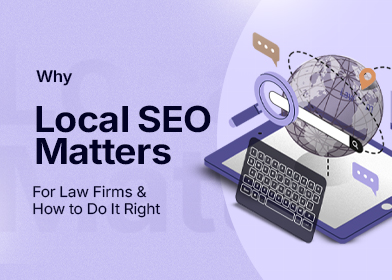
When someone types “divorce lawyer near me” or “best personal injury attorney in [Atlanta],” do they find your law firm? If not, you’re missing out on real clients with real legal needs.
Local SEO (Search Engine Optimization) is how law firms get found online when clients search. It helps your practice show up in Google Maps, the Local Pack, and other local search results.
In 2025, search behavior is changing fast.
- More than 76% of legal clients search online before hiring a lawyer
- Over 60% of mobile searches have local intent, meaning people are looking for services near them
If your firm isn’t showing up, your competition is.
How to Build a Law Firm Website That Drives SEO Growth
If your law firm’s website isn’t ranking well on Google, you could be missing out on valuable local clients. Here are key factors that make a website SEO-friendly and effective for legal practices:
Rank Higher in Local Searches
Your site needs to be optimized for relevant local keywords such as “family lawyer in Atlanta” or “criminal defense attorney near me,” so it appears prominently when potential clients search for legal services in your area.
Fast, Mobile-Responsive Design
Google prioritizes websites that load quickly and display well on all devices. A fast, mobile-friendly website not only improves your search rankings but also keeps visitors engaged and more likely to contact you.
SEO Best Practices Throughout
Effective SEO involves more than keywords. Every page should include optimized title tags, meta descriptions, image alt text, and structured data (schema markup) to help search engines understand your content and improve visibility.
Conversion-Focused User Experience
Getting website traffic is just the first step. The site must be designed to convert visitors into clients by including clear calls to action, client testimonials, trust signals, and easy-to-use contact forms.
Integration with Google Business Profile
Your website should work seamlessly with your Google Business Profile to boost your presence in local map results and “near me” searches, increasing the chances that local clients find and contact your firm.
The Real Struggles Law Firms Face Without Local SEO
The majority of people looking for legal services now start their search on Google. Without local lawyer search services in place, your firm stays hidden while competitors take the lead.
Here are common challenges law firms face without a local SEO strategy:
- Low visibility in location-specific searches
- Fewer phone calls and website inquiries
- An unoptimized or missing Google Business Profile
- Inconsistent listings across directories
- Lack of online reviews and credibility
- Missed local traffic, even when people are actively searching for your services
A recent study shows that 96% of legal clients use search engines to find legal help, but less than half of law firms have fully optimized their local presence.
Top Benefits of Local SEO Services for Law Firms Looking to Grow
If your law firm isn’t showing up in local search engine optimization results, you're missing out on high-intent clients in your area. Local SEO services for law firms help bridge that gap, making sure your legal practice appears where potential clients are looking.
Whether you're a solo attorney or part of a growing legal team, investing in location-based law firm SEO is essential for visibility, trust, and long-term growth.
Can SEO Solve These Problems?
Yes, especially when it's focused on your location. That’s where geo-targeted SEO for law offices comes in. These strategies are designed to put your firm in front of people searching for local legal help in your exact region.
Here’s how it works:
1. Geo-Targeted Visibility
With SEO for legal practices in specific regions, your firm ranks higher in local area map packs, mobile searches, and “near me” queries.
2. More Local Leads
Local SEO optimization for attorneys targets people who are ready to hire — not just browse — increasing your chances of getting high-quality leads.
3. Stronger Local Reputation
By optimizing your Google Business Profile and collecting client reviews, you build trust in your city or region.
4. Directory Accuracy
We clean up your law firm’s listings across Avvo, Yelp, Justia, and legal directories — improving consistency, authority, and rankings.
5. Scalable, Long-Term Growth
Paid ads stop when your budget does. Location-based law firm SEO keeps driving traffic and leads month after month.
Looking for a Solution That’s Tailored & Affordable?
That’s where LegalPeel stands out.
We offer local SEO optimization for attorneys that’s built around your firm’s unique practice areas and local market.
Why Law Firms Choose an Agency like(LegalPeel):
- Custom legal websites optimized for speed, mobile, and search
- Geo-targeted landing pages that rank in your practice cities
- Full Google Business Profile management
- Smart review strategy for local events trust
- Monthly reporting with keyword and lead tracking
- Affordable pricing for firms of all sizes
Whether you need SEO for legal practices in specific regions or a full local visibility overhaul, we help your firm appear, get noticed, and grow.
Who Else Offers Local seo for lawyers' Services?
Other providers are offering local SEO services for law firms, including:
- Rankings.io
- LegalPeel
- Scorpion
- JurisDigital
- Nifty Marketing
- Hennessey Digital
- Justia
These companies work with legal clients, but LegalPeel offers one key difference: we combine law firm-specific web design with local SEO execution, giving you an all-in-one growth engine.
Looking for a Solution That’s Tailored to local seo for Law Firms?
That’s where LegalPeel comes in.
We offer local SEO services built specifically for law firms, helping you attract more clients from your city or region.
Here’s what’s included in our plans:
- Google Business Profile optimization
- Local citation building and cleanup
- Review generation and management
- City-specific content for your legal niche
- Transparent monthly reporting
Final Thoughts: Win More Local Clients with Top SEO Solutions
If your law firm isn’t ranking in local search results, you’re missing out on clients actively looking for legal help in your area. At LegalPeel, we specialize in building
tailored local SEO campaigns that boost your visibility, improve your local search engine rankings, and turn searchers into paying clients. From local keyword optimization and technical SEO to localized content, Google Business Profile management, and local backlinks, we handle it all. We don’t just help you appear in local searches;
We position your firm as the top local choice. If you’re ready to stop losing leads to competitors and start owning your market, let LegalPeel lead your local SEO strategy.
A personal injury law firm in Atlanta saw 3x more calls in just 90 days
Ready to Grow Your Law Firm in Your Local Market?
Let us handle your SEO — so you can focus on winning cases.

Why Law Firm Branding Matters More Than You Think
Here’s something many lawyers overlook:
Clients can’t truly evaluate your legal skills until after they’ve hired you.
So what are they evaluating before that?
Your brand, the way your firm looks, sounds, and presents itself, is often the first (and only) clue they have.
Before a consultation or case review, potential clients are asking themselves:
- “Does this firm feel trustworthy?”
- “Do they seem like professionals I can rely on?”
- “Can they handle my specific legal issue?”
A strong brand helps answer those questions.
It reassures people that your firm is competent, experienced, and the right choice — even before they speak to you.
What Is Legal Firm Branding? (And Why It’s the #1 Driver of New Revenue)
Branding isn’t just a logo, it’s a whole experience. When paired with best-in-class content marketing for law firms, your brand builds immediate authority, letting you command premium fees and outshine competitors.
Every part of your brand, from your website’s look to the tone of your emails, shapes how potential clients feel about your firm. When everything works together, your firm doesn’t just look professional, it feels trustworthy.
Get your free brand audit today.
Unlock Explosive Growth: Why Powerful Legal Firm Branding Is Non-Negotiable
Firms with standout brands grow twice as fast, but only if a specialized digital marketing agency for law firms executes your digital strategy. Your brand, amplified through targeted web marketing for law firms, becomes your highest-ROI asset, marketing strategies driving more calls and higher-value cases.
Effective marketing efforts across the right channels can significantly boost visibility for any legal practice. A well-designed law firm website combined with strategic lead generation drives client acquisition and growth.
Ready to build a market-dominating brand? Let’s talk.
The 4 Pillars of a High-Conversion Legal Firm Brand
- Messaging That Sells on Autopilot via targeted content marketing for law firms.
- Visual Identity That Commands Premium Fees, showcased in your web marketing for law firms.
- Multi-Channel Touchpoints Everywhere—from social ads to email sequences, fully compliant with email marketing laws.
- A Differentiator That Makes You Unforgettable, enhanced with AI-driven insights from our AI marketing for law firms tools.
Book your Brand Affordable Plans now.
The Core Branding Services in the Legal Market
Logo Design
We craft unique logos just for law firms so you make a professional practice area for a first impression every time someone sees your name.
Brand Identity
We build your entire brand personality: colors, voice, and story. It all works together to grab attention, earn trust, and set you apart.
Typography & Visual Elements
We hand-pick fonts, icons, and graphics that match your legal expertise. The result? A consistent look that feels trustworthy everywhere you show up.
Advertising Design
Need ads that get noticed? We design social posts and print campaigns that shout “reliable” and “authoritative,” bringing the right clients to your door.
[[inner-cta]]
What Are the Steps to Build or Refresh Your Law Firm’s Brand?
- Audit Your Current Brand: What’s working? What’s outdated?
- Define Goals: Who are you trying to reach, and what do you want them to feel?
- Build Core Materials: Develop or revise your logo, website, tone, and messaging.
- Apply Consistently: Update all public-facing materials to reflect your brand.
- Gather Feedback: Monitor client response and refine as needed.
What Legal Branding Rules Should U.S. Law Firms Follow?
When branding your law firm:
- Ensure your firm name complies with state bar regulations
- Avoid misleading language about specialization unless certified
- Keep marketing communications compliant with legal advertising rules
Inside An Agecy Proven 5-Step Branding Accelerator for Law Firms
- Discovery: We audit your market, competitors, and current web marketing for law firms.
- Strategy: We map out your messaging, brand DNA, and content marketing for a law firm plan.
- Creative: We design your logo, color system, and typography—perfect for social media marketing for law firms.
- Activation: We roll out across the website, email (following email marketing laws), and paid channels.
- Optimization: We use AI-powered analytics to refine your campaigns—true AI marketing for law firms in action.
Start with a free Discovery Call.
Why Legal Firms Trust LegalPeel(Agency) for Branding That Converts
Expertise in Legal + Award-Winning Creative Execution
We specialize exclusively in the legal industry, blending deep legal marketing knowledge with bold, award-winning brand design.
Everything You Need to Build a Brand That Sells
We manage everything from brand messaging to website creation, digital marketing, and client acquisition strategies, allowing you to concentrate on winning cases.
Scalable Solutions for Firms at Every Stage
Whether you’re a solo practitioner or a multi-location law firm, we offer flexible branding packages tailored to your growth goals.
Proof in Action: How LegalPeel Clients Dominated Digital Marketing
- One firm saw a 300% jump in qualified leads through revamped web marketing for law firms.
- Another double case value is that of using a premium brand and targeted social media marketing for law firms.
Next-Level Branding: Tactics That 10× Your Visibility
- Live Chat on your site to capture hot leads.
- Emotional SEO Copywriting as part of your content marketing for law firms.
- Automated Review Requests sent via compliant email marketing laws workflows.
Final Thought: Your Brand 2025 Profit Boosting Authority Driving Blueprint
In today’s legal market, your brand is often the first thing potential clients judge. If it doesn’t instantly build trust, they move on. That’s why a clear, professional brand isn’t optional. It’s your edge.
Strong branding helps you stand out, attract better clients, and charge higher fees with confidence. It shows you're not just another law firm, but the law firm they can count on.
At LegalPeel, we combine deep legal marketing expertise with creative strategy to help your brand work harder—online, in ads, and everywhere your name appears.
Whether you're a solo attorney or part of a growing practice, we’ll build a brand that gets results.
Book your free Discovery Call and let’s turn your brand into your best business tool.
[[last-cta]]
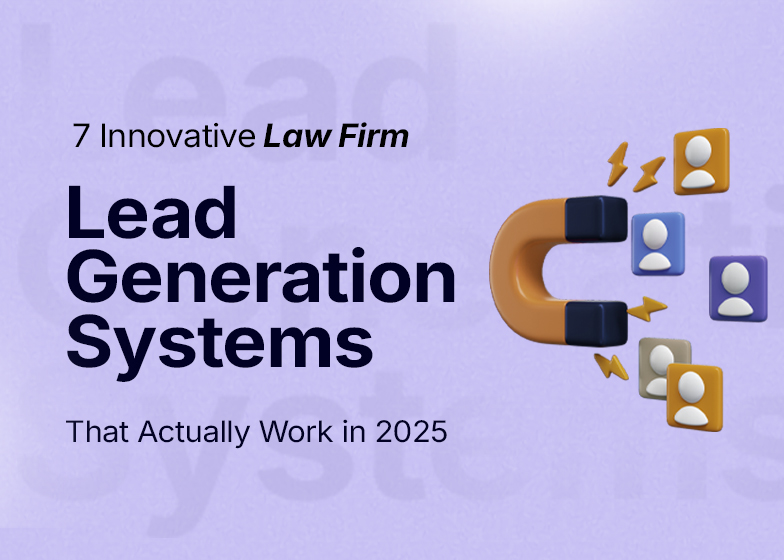
Lead generation is not one kind of billboard system. Not just visible to the clients. But also to create trust, consistency, and believability to the viewer.
But how can we do all these things?
Is the Lead Generation system different for a Law firm?
In the legal industry, great client experience and smart digital marketing powered by law firm SEO attract more legal clients.
In this article, we’ll explore the data-driven mechanics of generating high-quality leads for a law firm.
What Is Lead Generation for Lawyers?
Lead generation for lawyers is the process of attracting and converting potential clients (leads) into paying clients for your law firm.
It’s a universal marketing strategy used across industries, but in the legal field, it focuses on making your firm more visible, building trust, and encouraging people with legal needs to contact you.
In simple terms: It’s how you get new cases.
According to legal marketing research:
- Over 68% of law firms say generating quality leads is their biggest growth challenge.
- Firms that actively use online lead generation strategies see 2–3x more client inquiries than those relying solely on referrals.
An easy example for you: If your firm handles personal injury cases, your lead generation strategy might focus on people searching for “car accident lawyer near me” or “injury attorney in [city].”
Types of Law Firm Leads by Sales Funnel Stage
Understanding where your leads fall in the sales funnel helps you tailor your marketing and follow-up strategies for maximum conversions.
1. Cold Leads (Top of Funnel)
- Who they are: People who have only casually heard of your firm through ads, social media, or general searches.
- Goal: Build awareness and trust.
Best strategies:
- Blog content that answers common legal questions
- Social media posts introducing your services
- Free resources (e.g., downloadable legal checklists)
2. Warm Leads (Middle of Funnel)
- Who they are: Potential clients who know your firm and have shown some interest but aren’t ready to hire yet.
- Goal: Educate and nurture.
Best strategies:
- Email newsletters with legal tips
- Case studies showing your track record
- Webinars or Q&A sessions on legal topics
3. Hot Leads (Bottom of Funnel)
- Who they are: Prospects who are ready to hire and just need the final push to choose your firm.
- Goal: Convert them into paying clients.
Best strategies:
- Free consultations
- Clear pricing and service packages
- Client testimonials and reviews
- Strong, direct calls-to-action
Common Roadblocks to Effective Law Firm Lead Generation
Before your law firm invests time and resources in lead generation campaigns,
it’s essential to ensure your online presence and marketing foundation are solid
- Is your website free of errors like broken links or 404 pages?
Errors make your firm look unprofessional and drive visitors away. - Do you have landing pages or forms to capture visitor information?
Without these, interested prospects leave without letting you follow up. - Are you tracking website performance and visitor behavior?
Without data, you can’t fix what’s blocking potential clients from contacting you. - Is your website fast and mobile-friendly?
Most visitors use phones; slow or unresponsive sites lose their interest. - Is your website easy to navigate?
Confusing menus or clutter make it hard for visitors to find your services or contact info. - Is your firm’s branding consistent and professional?
A polished brand builds trust; inconsistent branding can turn clients away. - Is your messaging tailored to your specific legal practice areas?
Generic content doesn’t connect with clients seeking specialized legal help.
- Do you have a reliable follow-up process for captured leads?
Leads that aren’t contacted quickly often choose another attorney.
[[inner-cta]]
7 Innovative Law Firm Lead Generation Systems
1. Pay-Per-Click Advertising (PPC)
What is it?
PPC is a paid advertising model where law firms pay for clicks on ads that appear in search engines or social media. It’s a fast way to get your firm in front of potential clients actively searching for legal help.
How is it done?
Law firms create targeted ads with keywords like “divorce lawyer near me” and set a budget to appear at the top of search results or social feeds. Each click drives interested prospects to the firm’s website or landing page.
Insight:
Law firms running PPC campaigns often achieve a 2-5% conversion rate, making it one of the quickest ways to attract qualified leads. Learn more about PPC for lawyers.
2. Content Marketing
What is it?
Content marketing involves publishing helpful, SEO-optimized legal articles, guides, and FAQs to educate potential clients and build trust.
How is it done?
Law firms regularly create blog posts answering common legal questions, publish detailed guides, and update FAQs to improve SEO and attract organic traffic.
Insight:
Firms that blog consistently experience up to 67% more legal work leads than those that don’t. Discover effective content marketing strategies for law firms.
3. Social Media Marketing
What is it?
Social media marketing uses platforms like LinkedIn, Facebook, and Instagram to share legal content, engage with users, and raise brand awareness.
How is it done?
Lawyers post regular updates, share client testimonials, run targeted ads, and interact with followers to build relationships and encourage referrals.
Insight:
Approximately 75% of people say they have hired a legal professional based on social media recommendations or posts. Explore social media tips for lawyers.
4. Email Marketing Campaigns
What is it?
Email marketing involves sending targeted emails to nurture leads and encourage them to contact your law firm.
How is it done?
Firms send a welcome email with a free resource, followed by educational emails and a final call-to-action inviting prospects to schedule a consultation.
Insight:
Email marketing delivers an average ROI of 38:1, making it one of the most cost-effective ways for law firms to nurture leads. Learn how to build successful email campaigns.
5. Search Engine Optimization (SEO)
What is it?
SEO is the process of optimizing your law firm’s website so it appears higher in search engine results for keywords potential clients are searching, like “Atlanta personal injury lawyer” or “best divorce attorney near me.”
How is it done?
SEO involves keyword research, optimizing website content, improving site speed, earning backlinks, and keeping your Google Business Profile up-to-date to attract local clients.
Insight:
Law firms on the first page of Google capture over 90% of all search traffic, making SEO essential for sustainable lead generation. Learn how SEO works for law firms.
6. Legal Directories and Listings
What is it?
Legal directories are online platforms like Avvo, FindLaw, or Justia where law firms can list their services, contact details, and reviews to gain visibility.
How is it done?
Create and optimize profiles on reputable legal directories, ensuring consistent contact information, detailed service descriptions, and client reviews.
Insight:
Law firms with fully optimized profiles on multiple directories often see a 20–40% increase in qualified inquiries. See the best legal directories for lawyers.
7. Referral Marketing
What is it?
Referral marketing is the process of gaining new clients through recommendations from past clients, professional contacts, or other attorneys.
How is it done?
Build relationships with other professionals, maintain contact with satisfied clients, and offer value (like co-hosted events or free resources) to encourage referrals.
Insight:
Up to 62% of clients find their attorney through referrals, making it one of the most trusted and cost-effective lead sources. Learn how to create a referral strategy for your firm.
Why Should Law Firms Invest in Lead Generation?
Investing in lead generation is critical for law firms aiming to grow and maintain a steady flow of new clients. In today’s competitive legal market, relying solely on referrals or word-of-mouth is no longer enough.
Effective lead generation helps your firm:
- Reach more qualified clients actively seeking legal help online.
- Build lasting trust and authority through consistent marketing and valuable content.
- Stay competitive by ensuring your firm appears when potential clients search for legal services.
- Create predictable revenue streams by converting website visitors into paying clients.
Law firms can ensure sustainable growth and long-term success by investing in proven lead generation strategies.
Should Law Firms Hire a Lead Generation Company or Agency?
If you want more clients but don’t have the time or skills to run marketing yourself, hiring an agency can be a smart move.
Why It Helps:
- They know law firm marketing. Legal marketing agencies understand keywords, compliance rules, and what actually gets clients to call.
- Saves you time. You focus on cases, and they handle the ads, SEO, and tracking.
- Better results, faster. Agencies have proven strategies and tools that work right away.
- Costs less in the long run. No wasted ad spend or trial-and-error.
- Easy to grow. They can quickly expand your campaigns as your firm grows.
If you want steady, high-quality leads without the stress, an agency is often the best choice.. And LegalPeel can be a best chooice for you.
FAQ in Legal Marketing practice area
1. What is lead generation for law firms?
Lead generation for law firms is the process of attracting potential clients and converting them into paying clients. It focuses on increasing your firm’s visibility, building trust, and encouraging people who need legal help to contact you.
2. What are the most effective lead generation strategies for lawyers?
Some of the most effective strategies include:
- Search Engine Optimization (SEO) to rank higher in Google searches
- Pay-Per-Click (PPC) advertising for instant visibility
- Content marketing to build trust and authority
- Social media marketing for community engagement
- Email marketing campaigns to nurture leads
3. Why is SEO important for law firm lead generation?
SEO helps your law firm appear on the first page of Google when potential clients search for legal services. Since over 90% of search traffic goes to first-page results, ranking higher means more clicks, more inquiries, and more cases.
4. How can law firms turn website visitors into clients?
To convert visitors into clients, law firms need:
- Clear calls-to-action (CTAs) like “Book a Free Consultation”
- Fast, mobile-friendly websites
- Trust-building elements like testimonials and case results
- Easy-to-use contact forms or live chat options
5. Should a law firm hire a lead generation agency?
Hiring a specialized legal marketing agency can save time, reduce trial-and-error, and bring faster results. Agencies understand legal marketing compliance, know the right keywords, and can create targeted campaigns to consistently attract qualified leads.
[[last-cta]]
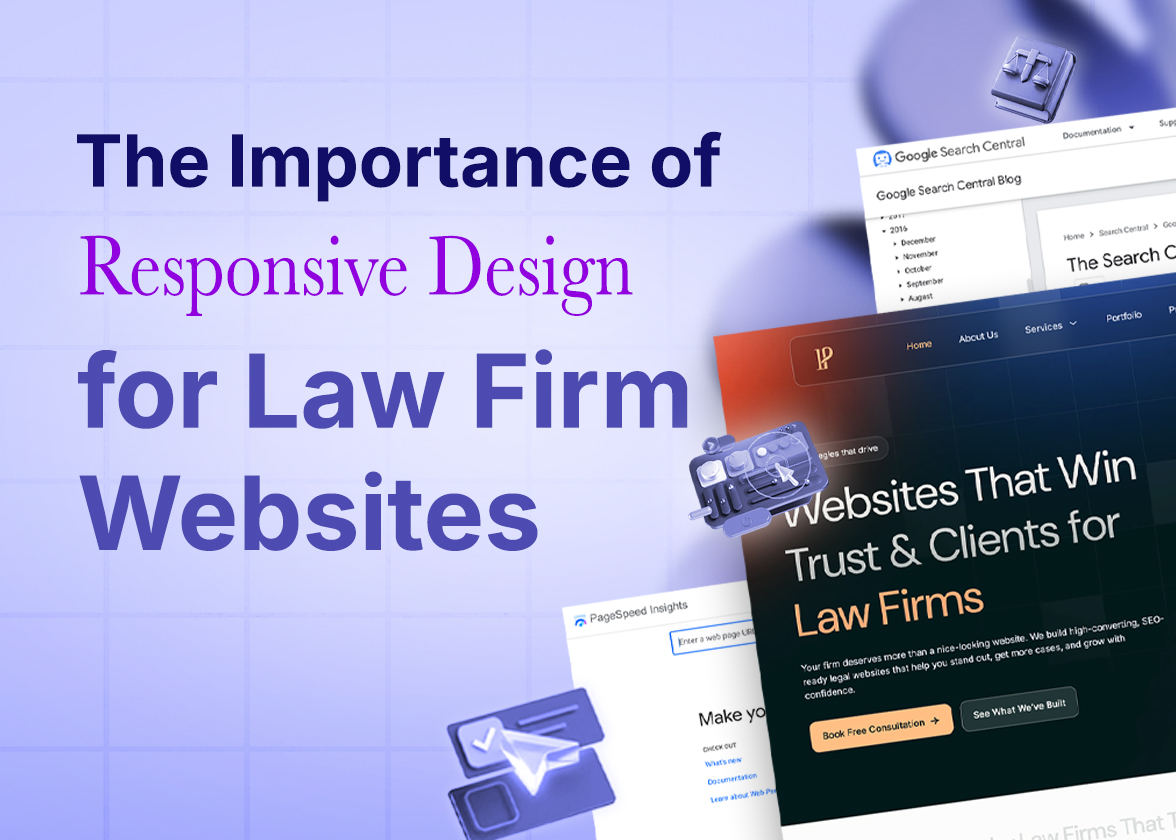
More than half of all web traffic now comes from mobile devices, and roughly 60% of visits are from phones as of mid-2026.
That makes mobile optimization for law firms more important than ever. Potential clients aren’t sitting at their desks. They’re searching “lawyer near me” on their phones, scanning reviews, and making quick decisions about who to call.
Google also ranks sites based on mobile-first indexing, so your mobile experience directly affects whether people even find you in search results.
The takeaway? Without proper mobile optimization for law firms, you risk losing trust, visibility, and valuable leads. In this guide, we’ll explore why mobile performance is now central to law firm growth.
What Mobile Optimization Really Means for Law Firms
When we talk about mobile optimization, it’s more than just making your website “fit” on a phone screen. For law firms, mobile optimization is about creating a fast, readable, and interactive experience for every potential client, no matter the device. Think of it as turning your law firm’s website into a digital receptionist that works 24/7, guiding clients seamlessly from discovery to consultation.
Responsive vs. Adaptive Design:
- Responsive design automatically adjusts your website’s layout to fit any screen size, including phones, tablets, and desktops.
- Adaptive design detects the device and serves a pre-set layout optimized for that screen.
For law firms in Atlanta, responsive design is often the preferred choice because it ensures consistent branding and experience across all devices, which is crucial for client trust.
Why Mobile Responsiveness Matters for Law Firm Websites
Client Expectations Are Changing:
Most potential clients in Atlanta now search for attorneys on their phones. They expect:
- Quick access to services and attorney information
- Clickable phone numbers and forms
- Fast-loading pages that don’t frustrate or confuse
If your website doesn’t meet these expectations, clients often leave and never return.
SEO Impact:
Google now prioritizes mobile-first indexing, which means your site’s mobile performance directly affects your search rankings. A slow or poorly optimized mobile site can push your law firm below competitors, even if your services are top-notch.
Business Impact:
- Lost phone calls and email inquiries
- Lower lead conversion rates
- Poor perception of your firm’s professionalism
Local SEO & Geo-Focus:
For law firms targeting Atlanta or Georgia, mobile optimization boosts local search visibility. Queries like “Atlanta personal injury lawyer near me” or “best criminal defense attorney in Georgia” favor mobile-friendly websites, giving you a competitive edge in your market.
Key Benefits of Mobile Optimization for Law Firms
Mobile optimization is critical for law firms that want to attract more clients online. With most people using smartphones to search for legal services, a mobile-friendly website can improve user experience, SEO, and client engagement. Let’s explore the key benefits:
I. How Does Mobile Optimization Enhance Web Design User Experience?
A mobile-friendly site ensures visitors can easily navigate and interact with your content:
- Simple, clear menus and intuitive design make browsing effortless on any device.
- Fast-loading pages reduce frustration and keep potential clients on your site longer.
- Mobile-friendly forms and click-to-call buttons allow users to contact your firm instantly.
Result: Happy visitors are more likely to stay, return, and refer others.
II. Can Mobile Optimization Improve SEO Performance?
Yes! Mobile responsiveness is a major factor in Google’s ranking algorithm:
- Higher rankings in both desktop and mobile search results.
- Better local search visibility, helping your firm get found by nearby clients.
- Faster page speeds, improve search performance, and reduce bounce rates.
Result: Your firm ranks higher, attracting more qualified leads.
III. How Does Mobile Optimization Increase Client Engagement?
Interactive features work seamlessly on mobile, keeping visitors engaged:
- Consultation buttons, forms, and chat features function smoothly on smartphones.
- Longer session durations increase the chance that visitors become clients.
Result: Engaged users are more likely to schedule consultations or call your office.
IV. Why Is Mobile Optimization a Competitive Advantage?
A modern mobile site sets your firm apart:
- Stand out from competitors who have outdated mobile experiences.
- Show professionalism and credibility to prospective clients browsing on their phones.
Result: A strong mobile presence builds trust and attracts more clients.
V. How Does Mobile Optimization Support Accessibility & Compliance?
Mobile optimization makes your website accessible to everyone:
- ADA compliance ensures that users with disabilities can access your site.
- Easy navigation for all visitors improves usability and inclusivity.
Result: Your website meets legal standards and serves a wider audience.
VI. How Can Mobile Analytics Improve Your Law Firm’s Website?
Tracking mobile-specific data helps refine your online presence:
- Use Google Analytics to monitor traffic, bounce rate, and engagement.
- Optimize pages based on session duration, retention, and conversion metrics.
Result: Data-driven improvements increase mobile conversions and ROI.
VII. Why is mobile optimization important for law firms in the USA?
Because most legal clients search on smartphones, a mobile-friendly site ensures seamless navigation, faster communication, and stronger first impressions.
[[inner-cta]]
Testing and Improving Mobile Optimization for Law Firms
Mobile optimization isn’t a one-time setup — it requires ongoing testing and refinement. Here’s how law firms can ensure their website stays fast, functional, and user-friendly:
1. Use Google’s Mobile-Friendly Test
- Quickly check if your law firm’s site meets Google’s mobile usability standards.
- Identify issues like text size, clickable elements, or layout problems.
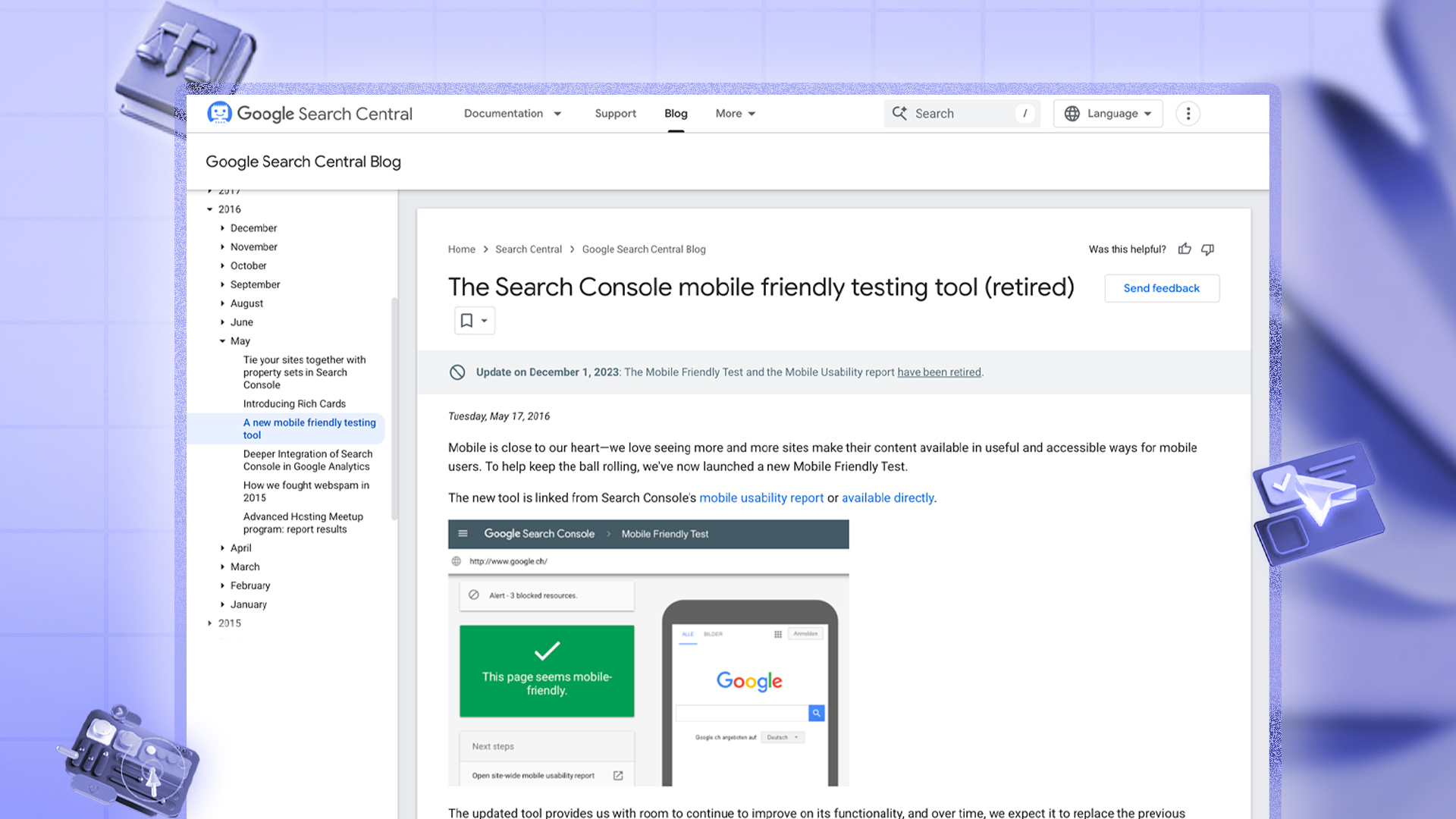
2. Track Mobile Behavior with Analytics
- Use Google Analytics or GA4 to monitor bounce rates, session durations, and conversions from mobile devices.
- Compare mobile vs desktop data to spot performance gaps.
3. Run PageSpeed Insights
- Test how fast your mobile pages load.
- Optimize images, enable caching, and minimize scripts to reduce load times.

4. Test Across Multiple Devices
- Don’t just test on your own phone — check performance on different devices and browsers.
- Tools like BrowserStack or Webflow’s responsive preview can help.
5. Prioritize Core Web Vitals
- Focus on LCP (Largest Contentful Paint), FID (First Input Delay), and CLS (Cumulative Layout Shift).
- These metrics are part of Google’s ranking signals and directly impact mobile SEO.
6. Gather Real User Feedback
- Ask clients or staff to test your site on their phones.
- Identify areas of confusion or frustration, then refine the design accordingly.
Result: Continuous testing ensures your law firm’s website remains optimized, competitive, and client-friendly as technology and user expectations evolve.
Ready to Optimize Your Law Firm’s Website for Mobile Success?
At LegalPeel, we specialize in building mobile-optimized, SEO-ready websites that convert visitors into qualified leads.
Whether you're a solo attorney or a multi-location law firm, our responsive designs ensure your site looks perfect on every device.
Let LegalPeel Help You:
- Improve mobile speed & UX
- Rank higher in local searches
- Capture more leads from smartphones
- Ensure ADA compliance & mobile analytics
Schedule Your Free Website Audit
[[last-cta]]
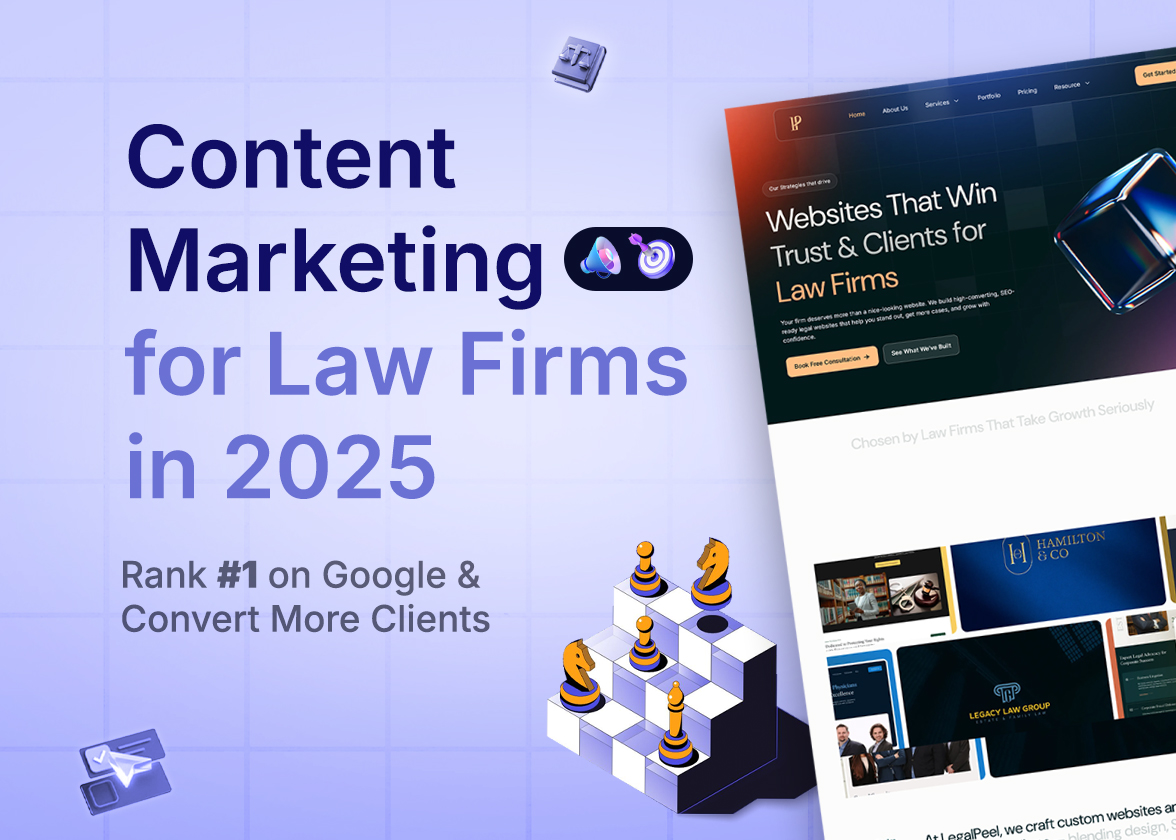
Struggling to Rank or Get Leads Online?
Still stuck on page 3 of Google? You're not just missing traffic, you're losing clients.
You’re not alone. In 2026, digital competition is tougher than ever. Most potential clients won't find you if you're not on page 1.
The opportunity? Content marketing isn’t just a buzzword; it’s the most effective way to boost your rankings and content strategy. Build credibility and attract high-quality leads.
If you’ve been looking for a way to turn your law firm’s content into real client inquiries, this is where you’ll find your solution.
Why This Guide Matters
This guide is your roadmap to smarter, more profitable marketing. Whether you're a solo attorney or managing a full-scale firm, or a personal injury lawyer, you'll discover proven strategies to:
- Rank higher in search results
- Build lasting client trust
- Convert traffic into real consultations
So, stay tuned with us to see the mystery process you can dominate digital marketing with the help of content marketing.
Content Marketing: What Every Law Firm Should Know
What Is Content Marketing?
It’s more than just blog posts. Content marketing is the intentional creation and sharing of valuable information to attract, educate, and convert prospective clients.
Did you know? 70% of people would rather learn about a law firm through articles than ads.
What Makes It Work?
- Consistency: One blog won’t cut it. You need a content system.
- Relevance: Each piece must connect to your client’s real concerns.
- Strategy: Everything should serve your business and SEO goals.
LegalPeel simplifies it all with done-for-you planning, writing, and promotion.
How Content Marketing Fits Into Digital Marketing for Law Firms
Digital marketing is the umbrella; content marketing is the engine.
While digital marketing includes SEO, paid ads, social media, and email campaigns, none of those work effectively without strong content at the core.
Here’s how they connect:
- SEO & Content → Search engines reward law firms that consistently publish optimized, without content, SEO has nothing to rank.
- Paid Ads & Content → Ads get the click, but the content on your landing page is what convinces people to book a consultation.
- Social Media & Content → Posts, articles, and videos keep your firm top-of-mind and shareable.
- Email Marketing & Content → Newsletters, guides, and updates nurture leads until they’re ready to hire.
Tips: Grow Your Firm’s Leads — See How
Why Content Marketing is the Top Growth Strategy for Law Firms
Fact: 70% of legal clients research online before ever making contact.
You're losing valuable leads if your firm isn’t visible in that journey.
Here’s how content marketing helps:
- Boosts visibility on search engine optimization
- Builds trust with prospective clients
- Converts website visitors into consultations
Firms working with LegalPeel see 3x more organic leads in just 6 months.
[[inner-cta]]
How Google Ranks Legal Content in 2026

Google now rewards content that meets its E-E-A-T criteria:
- Experience
- Expertise
- Authoritativeness
- Trustworthiness
This means your content must be:
- Legally accurate
- SEO-optimized
- Engaging and easy to understand
- search engine rankings
So, create your content that performs in search and resonates with readers.
Why Smart Law Firms Are Going All-In on Content
Real Benefits of Content Marketing
- More Leads: Generate 3x more leads at 62% lower cost than traditional methods.
- Better SEO: Rank higher on Google and get discovered by people actively searching.
- Stronger Brand Trust: Become the attorney people recognize and respect.
- Increased Conversions: Educated clients are more likely to call, click, and commit.
What Types of SEO Content Work for Law Firms?
Here’s what generates real results:
- Blog posts answering client FAQs
- SEO-optimized practice area pages
- Long-form legal services guides
- Attorney Q&A videos turned into blogs
- Google Business Profile content for local SEO
What do you need an Agency for?
An agency doesn’t just write blogs; it delivers a full-stack content system tailored for law firms. That includes:
- SEO-optimized practice area pages
- Educational blog posts & legal guides
- Google Business Profile content
- Attorney Q&A videos turned into articles
- Strategic content calendars & planning
All designed to drive organic traffic and convert visitors into real client inquiries. If you need any suggetion are 24/7 open for you.
4-Week Content Calendar for Law Firms (Ready-to-Publish)
Why Leading Law Firms Choose Agency For Content Marketing
Proven Strategy That Delivers
We don’t just create content, we build targeted strategies designed to drive traffic, generate qualified leads, and grow your caseload. Every word we write serves a purpose.
Fully Managed, Hassle-Free Execution
From content planning to publishing, we handle it all. Stay focused on your clients, we’ll take care of the marketing that brings them in.
Legally Accurate, Professionally Written
Our team blends legal knowledge with digital marketing expertise to produce compliant, credible, and conversion-ready content. No fluff, no risk.
Tailored Content Calendars Built for Growth
We map out a strategic publishing plan aligned with your practice areas, SEO goals, and client acquisition strategy, so you never miss an opportunity to get found.
Real Results. Clear Reporting.
Track exactly how your content is performing. We provide simple, insightful reporting that shows your growth in rankings, traffic, and consultation.
Powerful Content Writing for Law Firms That Converts
Effective content writing is key to building a strong online presence and connecting with your target audience. For law firms, publishing high-quality content, from insightful blog posts and engaging landing pages to persuasive case studies, helps establish trust and authority.
Thoughtful keyword research ensures your message resonates, while well-crafted stories can turn a visitor into a new client. Pair this with compelling social media posts and data-backed insights from analytics, and your marketing efforts become far more impactful.
Great content supports your visibility in Google Search, enhances your local search reach, and complements your technical SEO strategy to drive meaningful results.
Ready to turn your law firm’s content into a client-generating machine?
[[last-cta]]
.webp)
If you are a professional in Legal Services or you are a lawyer, then you have already heard about Legal Funnel
But can you know its inner things?
Is it complex to use or easy to control?
And if it does feel complicated, what’s the alternative?
In this guide, we’ll walk you through what Legal Funnel is, how to log in, and most importantly, what to do if you find it hard to use, including a smarter replacement option that simplifies everything.
What Is Legal Funnel?
Legal Funnel is a platform designed for lawyers to automate client intake and marketing processes. It helps you create funnels, landing pages, and email sequences that capture leads and turn them into clients, without needing advanced technical skills.
Why lawyers use it:
- Build automatic client intake funnels
- Create landing pages that convert visitors
- Track and manage leads in one place
- Reduce manual follow-ups with automated emails
While Legal Funnel provides these tools, some lawyers struggle to use them effectively.
What Is LegalPeel?
LegalPeel is a full-service agency for law firms, not just a tool. It acts like a complete growth package, combining strategy, design, and execution to help firms succeed online.
LegalPeel offers:
- Digital marketing strategy designed for your firm
- Website design and development that looks professional
- SEO services to help potential clients find you easily
- Lead generation support to turn visitors into actual clients
- Instead of juggling multiple tools or trying to figure out complex marketing, LegalPeel creates a cohesive system that integrates your website, marketing, and client acquisition efforts.
Why Law Firms Should Consider LegalPeel
Lawyers choose LegalPeel because:
- Setting up funnels and marketing on your own can be time-consuming and confusing
- DIY tools often lack guidance and strategy
- Every package is designed to attract and convert real clients
- You get expert support without needing to hire multiple teams or learn technical software
Simply put, LegalPeel helps lawyers get results faster, easier, and smarter.
How to Get Started with Legal Funnel (Without Getting Overwhelmed)
If you’re a lawyer thinking, “I need more clients, but I don’t want to spend my life chasing leads,” that’s exactly what Legal Funnel helps with.
Here’s a simple, real-world walkthrough to help you get started the right way, no tech jargon, no fluff.
Step 1: Check Out Legal Funnel’s Website
Go to www.legalfunnel.com and take a few minutes to look around.
You’ll see:
- What the program is all about
- Real stories and testimonials from other attorneys
- The different training tracks (“Mastery,” “Grow,” and “Automation”)
When ready, click “Join Now” or “Apply to Join.”
Heads-up: It’s a paid program. Before you join, you’ll usually book a short discovery call to make sure it’s a good fit.
Step 2: Fill Out the Application

It’s quick and straightforward. You’ll be asked for:
- Your name, firm name, email, and phone number
- Your practice area
- A few short questions like “What kind of law do you practice?” or “What’s your biggest growth challenge right now?”
After you submit, you’ll get an email to schedule your discovery call.
Step 3: Join the Discovery Call
This is a short conversation, usually over Zoom or the phone.
The team will explain:
- What’s included in the program: training, templates, automations, and support
- Which plan fits your firm best
- Pricing and expected results
Step 4: Automate Enroll and Get Access

Once you enroll, you’ll receive:
- A welcome email
- A login link: login.legalfunnel.com
- Your username and password
Bookmark that page, it’s where you’ll build and manage everything.
Step 5: Go Through the Onboarding(Landing Page)
Inside your dashboard, start by watching the short introduction videos. They’ll walk you through how the system works and how to get results faster.
Next, connect your tools:
- Your email (Gmail, Outlook, etc.)
- Your calendar (Google Calendar, Calendly, etc.)
- Your CRM or intake system (Clio, Lawmatics, or Legal Funnel CRM)
There are also plenty of templates and checklists waiting for you. Use them to save time and avoid guesswork.
Step 6: Pick Your Funnel and Make It Yours
Choose a funnel template that matches your practice area, such as:
- Personal Injury
- Family Law
- Immigration
- Estate Planning
- Criminal Defense
Then customize it:
- Update the headline, message, and call-to-action
- Add your firm’s logo and colors
- Include your testimonials and disclaimers
Step 7: Launch Your Funnel
Once everything’s ready, it’s time to go live.
Connect your funnel to your traffic sources:
- Google Ads
- Facebook or Instagram
- YouTube Ads
- Your website, blog, or social media pages
Then test everything:
- Are the forms working?
- Are you receiving lead notifications?
- Is your calendar syncing properly?
When everything checks out, launch your funnel.
Step 8: Track What’s Working
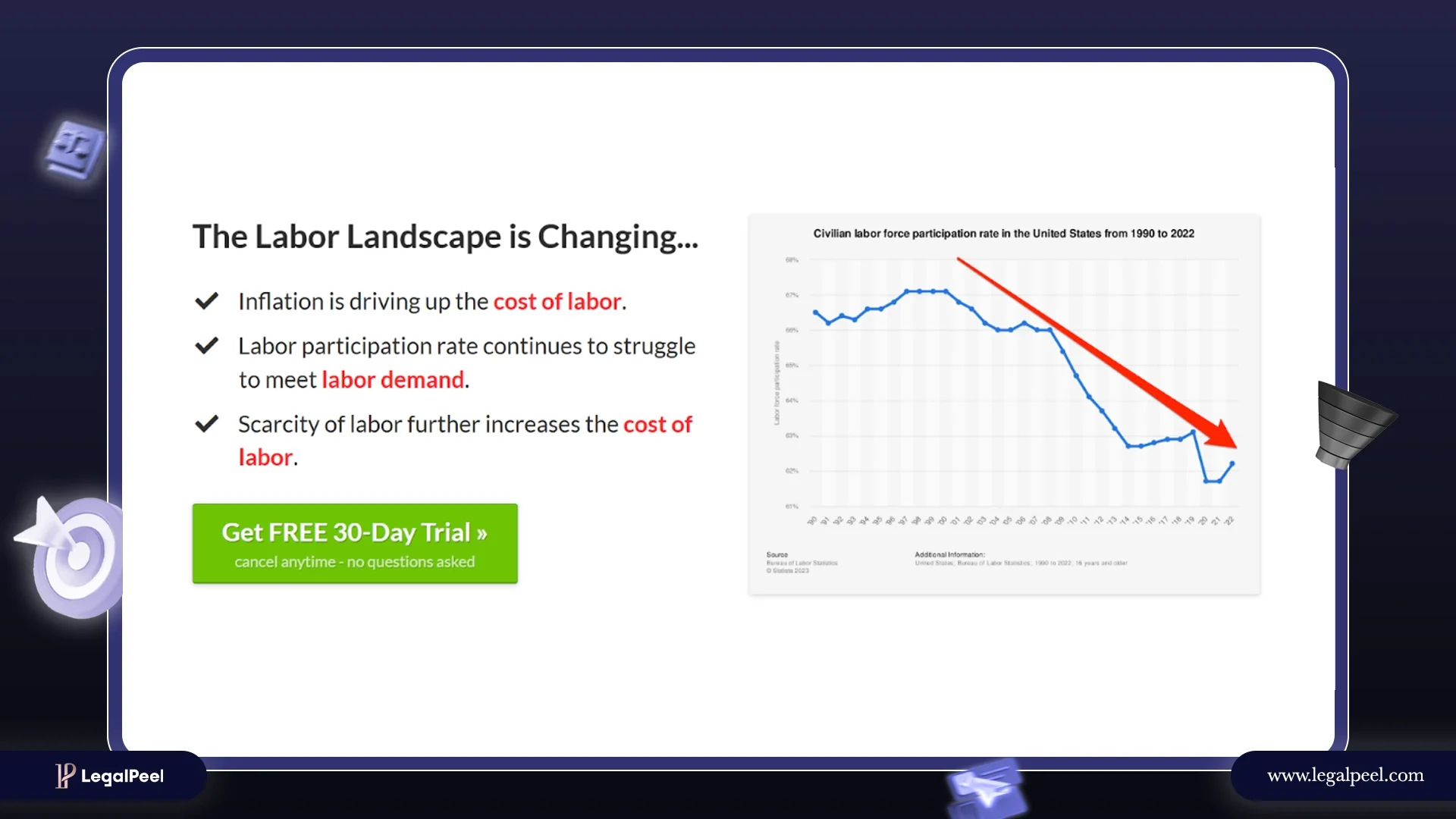
Inside your Legal Funnel dashboard, monitor your results:
- How many leads are you getting
- Conversion rates
- Ad spend and ROI
Then keep improving:
- Test new headlines, offers, or visuals
- Experiment with audiences or keywords
- Refine your follow-up messages
Even small tweaks can make a big difference.
Step 9: Scale Up
Once your first funnel is working, you can expand.
- Create new funnels for other practice areas or regions
- Delegate intake tasks to a team member or virtual assistant
- Automate your onboarding, contracts, and payments
- Stay connected to the Legal Funnel community for new strategies and updates
Step 10: Stay Ethical and Compliant
Always follow your state bar’s marketing and advertising rules.
- Include clear disclaimers
- Never promise results
- Keep all client information secure
- Review your ads regularly to stay compliant
Quick Checklist(Make Everything Easy)
Which Is Better: LegalPeel or Legal Funnel?
- Legal Funnel is a powerful tool for automating client intake and marketing, but it requires time, setup, and tech know-how.
- LegalPeel is a full-service agency that operates in the Legal niche and — from funnel setup to automation, SEO, and lead generation.
- If you want DIY control and are comfortable with tech, Legal Funnel works well.
- If you want done-for-you results without the hassle, LegalPeel is the smarter choice.
Bottom line: LegalPeel combines strategy, tools, and support so your law firm grows faster with less stress.
LegalPeel vs. Legal Marketing Funnel
Explore More Legal Tools: Try Smart FOIA by LegalPeel
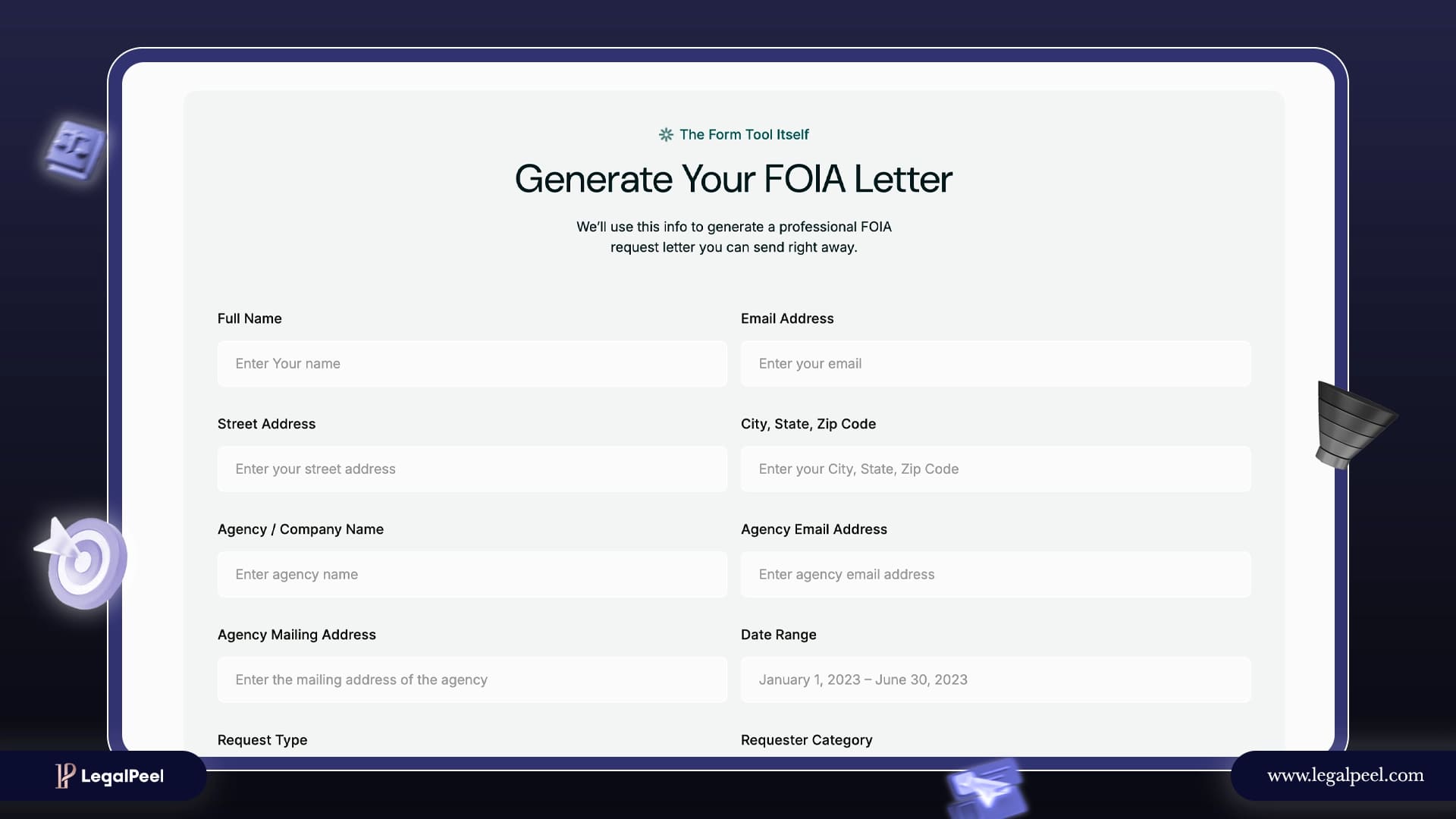
If you’re already using Legal Funnel or considering LegalPeel for your firm’s growth, don’t miss another helpful resource, Smart FOIA. This free tool lets lawyers instantly create accurate Freedom of Information Act (FOIA) request letters.
Final Thoughts
Legal Funnel is great for automating client intake, but without a strategy, many lawyers get stuck.
LegalPeel solves this problem by offering:
- Full-service funnel and website setup
- SEO-optimized websites
- Personalized lead management strategy
- Expert ongoing support
“With LegalPeel, you don’t just use a funnel, you get a complete growth system for your law firm.”
→ Book your free LegalPeel strategy session today and start generating leads smarter, faster, and more reliably.
.jpg)
It is astonishing that in 2026, you have a solo law firm but do not have any online presence.
Or, if you have a solo law firm site but zero responsiveness & Poor design. Then this guide will help you.
Before starting the full guide, please take a look at the current data:
- 78% of legal consumers research before they contac
- 65% people choose a lawyer based on online reviews
- Solo law firms using SEO see hundreds of percent ROI over time
- 96% of people seeking legal help start with a search engine
This guide will cover the key website features and must-have pages every solo law firm needs to build trust, attract clients, and grow.
Top 3 Reasons Why Law Firms Need an Excellent Website
Does your first impression matter?
Think about it: your website is usually the first place potential clients meet you. A clean, professional design instantly shows that you’re trustworthy and competent. If your site looks outdated or cluttered, people may doubt your credibility before they even call.
Can your website bring in clients?
Your website isn’t just a digital brochure; it’s a 24/7 marketing tool. Clear buttons, simple contact forms, and easy navigation guide visitors to take action. A well-designed site can turn casual visitors into real clients.
Does it show your expertise and credibility?
Your website is your online courtroom. Highlight your practice areas, attorney bio, case results, and client testimonials. These elements build trust, show your authority, and help potential clients feel confident choosing you.
What Are the Essential Website Features(Step by Step)
Every Solo Law Firm Website Design Needs in 2026?
1. User-Centric Design Foundation
A great law firm website starts with one goal: to help visitors find the legal services they need quickly.
That means:
- Clear paths to key actions (services, pricing, contact)
- Minimal distractions
- Simple layouts that guide people step-by-step
- A design that works the way real clients think, not the way agencies want
2. Strong Branding & Instant Legal Credibility
Your website should feel trustworthy the moment someone lands on it.
This happens through:
- A professional logo and clean color palette
- Consistent typography and visual style
- Messaging that matches your specific legal niche (family law, immigration, criminal defense, etc.)
- Immediate trust signals like badges, certifications, bar numbers
People judge credibility in seconds. Good branding makes sure they measure you correctly.
3. High-Conversion Homepage Wireframe (Modern Layout)
%20(1).webp)
A strong homepage follows a proven framework:
- Hero Section: Clear headline, helpful sub-headline, and a direct CTA
- Proof Bar: Reviews, ratings, results, logos
- Service Highlights: Quick overview of what you offer
- Attorney Introduction: A friendly, authoritative snapshot
- Testimonials: Social proof that builds trust
- Strong CTA Block: “Book Consultation” or “Contact the Firm”
This structure ensures visitors get the “who, what, why, and how” in under 20 seconds.
4. Intuitive Navigation & Simple Site Map
Clients shouldn’t have to hunt for information.
Use:
- A clean top menu (Home, Services, About, Contact)
- Practice area dropdowns
- Footer sitemap for secondary links
Smooth navigation = longer browsing + higher conversion.
[[inner-cta]]
5. Clear, Client-Centered Content
Content should be written for real people, not lawyers.
Include:
- Simple explanations of each service
- Step-by-step “How it Works”
- Who you serve (individuals, families, businesses)
- The benefits of hiring your firm (not just features)
Make content easy to scan, easy to read, and easy to understand.
6. High-Visibility Calls-to-Action (CTAs)
Your CTAs should be easy to find at all times:
- Primary CTA: “Book Consultation”
- Sticky header CTA button
- CTAs placed after key sections
- Contextual CTAs inside each service/practice page
Never make users hunt for the next step.
7. Attorney Bio & Personal Authority Section
People hire lawyers, not websites.
Show the human side with:
- A professional, friendly detail
- Credentials, education, bar listing
- Key experience and notable results
- A short personal story or statement that builds trust
Make your bio feel real and relatable.
8. Case Results / Portfolio Section
When allowed, results speak louder than words.
Include:
- Summaries of successful cases (without breaking confidentiality)
- Before/after results
- Practice-specific outcomes
- Short “client impact” stories
Clients want proof that you can solve their problem.
9. Testimonials & Social Proof
Trust grows when people see others recommending you.
Show:
- Verified client reviews
- Google, Avvo, and Facebook ratings
- Testimonials sorted by practice area
- Video testimonials (if possible)
Social proof reduces hesitation instantly.
10. Clear Contact & Communication Options
Make reaching you effortless:
- Phone number and email
- Contact form
- Appointment scheduling tool
- Live chat or chat widget
- Clear “next steps” message after submitting a form
People should never wonder how to get in touch.
11. Mobile-First, Fully Responsive Design
Most clients visit from a phone, so design for mobile first.
This includes:
- Fast-loading mobile layouts
- Thumb-friendly buttons
- CTAs and forms optimized for vertical scrolling
If your mobile experience is weak, your conversions will be too.
However, if you lack proper knowledge, it becomes complex.
So, this suggestion for you is a modern website design & development; take a look (Here). Sure, you did disappoint.
12. Accessibility & Legal Compliance
Your site should be usable for everyone.
Follow:
- Strong color contrast
- Alt text for images
- Clear typography and structure
Plus basic ADA-friendly formatting to avoid legal issues.
14. Legal Disclosures & Required Pages
Complete your professional foundation with:
- Disclaimer
- Privacy Policy
- Terms of Service
- Attorney Advertising disclaimer (if required by your state)
This guide will help you understand the mistakes about website design, so you can know before you work.
What are the best examples of high-performing solo law firm web designs?
So, your law firm website is one kind of mirror that reflects you. The question is how people are implementing this. Now, we will provide you with some practical examples of the ideal website design for the solo practitioner. This is all the live and enthusiastic website design made by LegalPeel( A perfect partner for lawyers)
Hero section:

This is the first phase of your site for a modern legal website. So, it must have a perfect structure. Perfect colour contrast & perfect user experience. That hunting people with people within a very short time, a few seconds. Also, maintain the perfect navigation bar in the hero section.
Personal profile & inner section:
In that section, different information and personal info about your professional life & experience that fully reflect your own visibility and strength. By including this section, your website doesn’t just show information; it builds credibility, connects with clients, and demonstrates why you’re the right attorney to hire.
.jpg)
CTA( call to action):
.jpg)
Perfectly, users come to your site, read website content, but don't know what to do next.
So, completing the perfect web design for a solo law firm must include add perfect CTA section that is used for scheduling a consultation, calling your office, or filling out a contact form.
How to Choose a Web Design Agency Without Losing Your Mind
If you are a solo attorney and want to best make a solo law firm website for your law firm, then an agency can help you to make your vision a success.
Do they understand you?
Depends on the marketing and their work procedure, but in LegalPeel, we assure the best modern website design. Basically, if we see that the other agencies, their own strategy that is not modern, how will they give you modern services?
Is SEO friendly?
A beautiful website is useless if no one can find it. Make sure your agency understands the basics of SEO so your site can rank on Google and attract clients. So, ask the agency if they give that type of service, then it's ok for you.
Is the site responsive?
Most clients browse on phones or tablets, so your website must work flawlessly on any device. Ask the agency if they build mobile-first, responsive designs that look great and function smoothly on all screen sizes.
Final thought:
A strong solo law firm website helps people trust you, shows your expertise, and makes it easy for clients to reach you. A modern, responsive site is not just a digital presence; it’s a tool that grows your practice.
Ready to build a trust-building, high-converting website for your solo law firm? Work with LegalPeel
[[last-cta]]
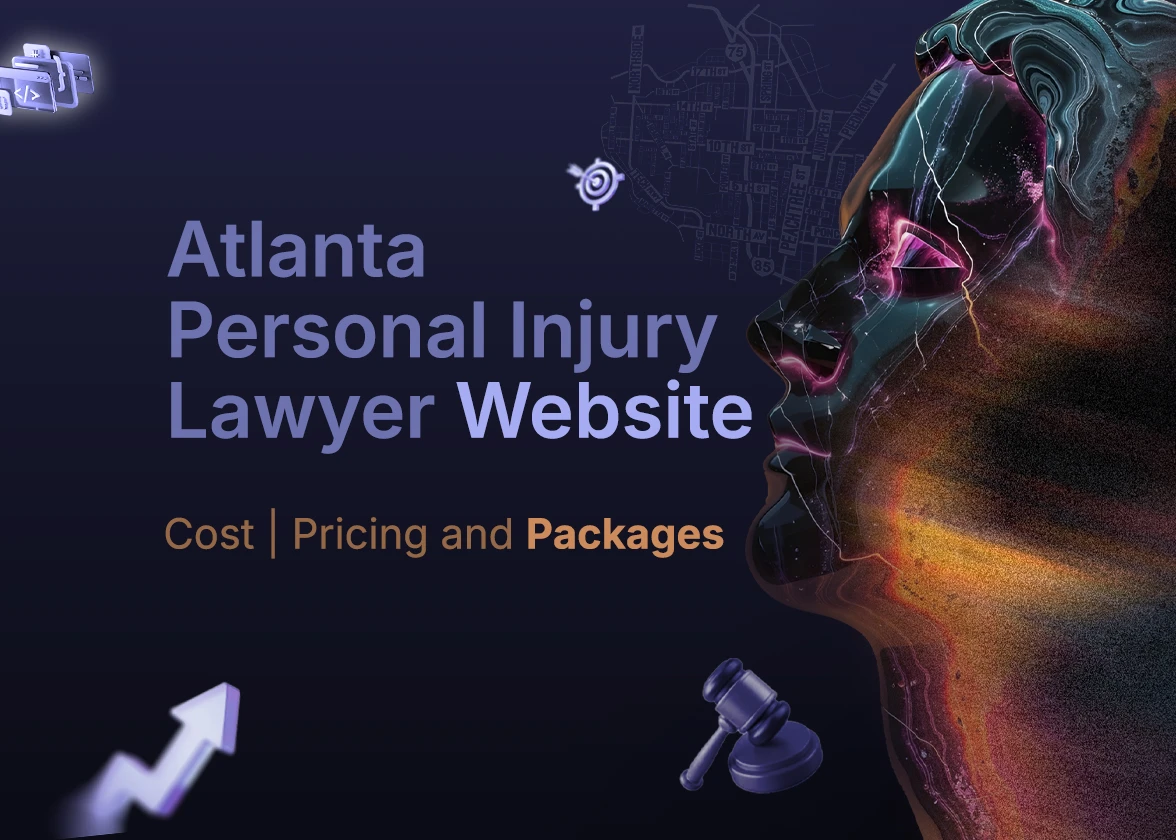
Atlanta is a hub for personal injury cases, and naturally, injury practitioners and law firms are everywhere. Competing in this crowded market isn’t easy.
Your quickest shortcut to standing out? A conversion-focused personal injury lawyer website for a strong online presence.
But the real question is: How much should a personal injury lawyer website cost in Atlanta?
The average cost of a personal injury firm website is $3,000–$15,000. The price varies depending on several key factors such as the number of pages, design flexibility, builder or platform choice, SEO requirements, hosting, and ongoing monthly maintenance.
In this guide, you’ll get a clear breakdown of average PI website pricing, setup costs, and design packages so you can avoid overpaying and make the right investment for your practice.
Why Your PI Law Firm Needs a Professional Website in Atlanta
Growing your personal injury practice is tough in Atlanta due to high competition. Already established a PI firm website with a high advertising budget, ranking on the 1st page.
How to claim leads when your competitors already dominate the search engine?
For solo attorneys and startup PI firms, going head-to-head with large firms may seem difficult. But it’s absolutely possible
What you need is a professional personal injury law firm website! It should include clear CTAs, fastest speed, responsive design, Atlanta-based service pages, and clear attorneys' bios or profiles.
Based on lawyer web marketing tactics, your website can rank on SERP, AI overview and GEO. And, you can expect high ROI from website investment.
But here’s the harsh truth.
Without a conversion-friendly personal injury law firm website, you can’t expect long-term success—no matter how much you spend on ads.
Bonus: Check out the inspiration guide on Atlanta law firm website design trends!
Average Cost to Build an Atlanta Personal Injury Lawyer Website
Atlanta Personal Injury Lawyer Website Cost: Detailed Breakdown
The average cost of a personal injury lawyer website ranges from $3,000– $15,000. It may vary depending on the number of practice area pages, features, branding, SEO, builder and hosting cost, and monthly maintenance cost.
Here's a clear cost breakdown of personal injury lawyers' website pricing in Atlanta.
Solo PI Lawyer Website
A solo personal injury attorney website costs around $3,000–$ 5,000.
Using a custom template, basic website features, Atlanta-specific service pages and essential pages, you can still have a professional website for personal injury lawyers.
Small PI Firm Website
Small personal injury law firm website costs typically range from $3,500– $8,000 in Atlanta.
You shouldn't invest in highly customized law firm website design. Prioritize having small law firm website must-have features.
The fair price for a small PI law firm design with semi-custom design $3,500-$6,000. And you have additional expenses for SEO, hosting, and maintenance.
So, keep in mind to avoid both cheap and high lawyer website quotes.
Medium PI Firm Website
Medium-sized injury law firms should invest at least $7,000–$15,000 for a fully SEO ready custom lawyer website.
Standing out as a personal injury firm in Atlanta is typically hard without competitive lawyer website features.
Your website should have a custom design homepage, separate multi-attorney profile, practice area pages, location location-specific service pages.
The mid-sized Atlanta personal injury attorney website pricing cost will include:
- Law firm branding
- SEO built in
- Google My Business profile setup and optimization
- CRM integration
Bonus: Read full guidelines on law firm website design cost and tips to avoid overpaying.
Factors Affecting Personal Injury Lawyer Website Cost
DIY Website Builder Selection
The cost to set up a lawyer website in Atlanta is often expensive. But, law firm website builders may cut half of the price.
The common website builder for law firms costs between $10-$100 per month.
- Webflow: Webflow’s SEO built-in features, custom templates and fastest hosting made it simply an outstanding choice for lawyers.
- WordPress: WordPress is a popular CMS to maintain content-heavy sites for lawyers. The plugin cost is often expensive for startup personal injury law firms.
- Wix: Wix is perfect for a basic lawyer website setup. Basically, it's the best option for solo practitioners who need a quick setup without advanced features.
Template VS Custom Web Design
Templated-based legal website costs less than customized sites.
The best PI lawyer website pricing strategy is to start with custom templates. And, later go with website redesign with CRM integration, several pages and resources.
Web Hosting and Maintenance Cost
Lawyer website hosting and maintenance costs range from $50-$500 per month. So, you have to consider this additional cost before investing in a personal injury lawyer website.
SEO
SEO with content may cost $500-$5,000/month, depending on firm size.
You need to invest in SEO, especially for small to medium-sized firms, for high-competition PI websites in Atlanta.
Tips: How much should you spend on a Personal injury law firm SEO in Atlanta? Try a law firm SEO cost calculator that reveals real ROI against your budget.
Website Design and Integration Complexity
Website design for personal injury lawyers can include a custom layout, SEO ready structure, and mobile responsiveness.
Also, integration like cover forms, client intake, blog, payment forms, CRM and software integration influence the cost to setup a personal injury attorney marketing website.
However, depending on your firm size or your preference, these design features can impact on lawyer website cost.
Agency vs Freelancer vs DIY Website
DIY website builder: You want to reduce cost with template based websites using popular CMS like Wix, Webflow, Squarespace. Yeah, you can!
But, you can’t properly design a clean code, SEO optimized, custom website without professional legal web development.
Freelancer: Cost to hire a freelance web designer is typically $1,000–$5,000.
Although you get an affordable attorney website but may lack compliance ready structure, Atlanta SEO optimization, and law industry-specific design.
Law firm Web Design Agency : Hiring a law firm website design services can cost from $3,000–$8,000. You have to invest a good amount. But, agencies tend to deliver a professional personal injury lawyer website for expertise in this legal industry.
[[inner-cta]]
LegalPeel’s Affordable and Custom Packages for Atlanta PI Lawyers
Atlanta based law firm web design agency is a best option for high competitive Personal injury practice.
At LegalPeel, you’ll get affordable website packages for lawyers. Here’s three popular law firm website packages for Atlanta PI lawyers.
1. Legal Authority Website
Best for: Solo lawyer and Small law firm website
Cost: $3500 (One time payment)
Includes:
- Custom Webflow website+SEO ready structure
- Full branding
- Google My Business Profile optimization
2. High Value Case Accelerator
Best for: Medium-sized personal Injury firm wants to grow
Cost:$400-$7000/ monthly
Includes:
- Conversion-ready custom Webflow website
- Advance SEO, GEO and AIO optimization
- Lead generation and case acquisition
- Retargeting campaign and full conversion focus funnels
3. Authority Builder SEO
Best for: All size PI firm, want to invest in personal injury lawyer website SEO for rank higher and get legal leads
- Atlanta-specific service page setup
- Technical SEO optimization
- High intent PPC campaign
- Google+Linkedin ads
- Legal content writing+backlink building
Request a custom law firm website quote now.
Why Hire an Atlanta-Based Agency for Your Personal Injury Lawyer Website?
There are so many benefits to rely on local web design services to dominate in a highly competitive era– Atlanta, Georgia.
Where to find?
LegalPeel is a leading law firm website design agency in Atlanta, completing 20+ websites projects for personal injury law firms.
Well, here’s a reason why to hire an Atlanta-specific agency:
1. Understand Atlanta PI Market
Knowledge of PI legal clients’ personas, their searching behaviors, and other competitors' analysis in the Atlanta area.
2. Accurate Local SEO Targeting
Target local semantic keywords, court-specific terminology and gap keywords in location-specific landing and practice area-specific pages.
3. Local Legal Requirement and Ethics Rules
Aware of Atlanta Bar Marketing rules, compliance and PI advertising expectations.
4. Know your PI Competitors Personally
Working with a previous personal injury law firm in Atlanta, they've clear mapping about PI law firm website, branding, content strategy and conversion funnels
5. Stronger Accountability
You can visit their agency office, have a personal strategy meeting and build a long-term relationship.
Get a Cost-Effective Injury Lawyer Website and Dominate in Atlanta
Growing personal injury practice in Atlanta is tough! And, your website is the actual weapon to get leads and conversions.
So, don't waste your budget on a non-professional law firm website. It'll cost more in the future.
Last tip: Create a custom website cost with web hosting and monthly expenses. Then, build your firm's website.
Don't know how to calculate cost or overpaying?
Feel free to contact us and have your custom quotes now!
[[last-cta]]
.jpg)
No matter how many tactics you try or how much money you spend, you can still lose potential clients. This often happens with the usual marketing everyone talks about — Ads, SEO, or lead generation.
Not sure which one to invest in first? That’s normal.
Before spending, you need to establish a bankruptcy law firm marketing foundation based on your budget, firm size, and ROI analytics.
This guide explains the foundation and outlines key strategies to remove confusion, helping you create the exact marketing plan your firm needs.
Establish a Solid Marketing Foundation for Bankruptcy Law Firms

Identifying the audience and implementing the right marketing tools and marketing tactics can minimize extra cost while maximizing ROI
So, know what factors determine successful bankruptcy lawyer marketing before investing marketing dollars.
Selecting target market:
Get to know about your target audience's demographics, location, salary, and intent.
Are they individuals, businesses, or corporations seeking debt relief?
Understanding bankruptcy leads:
Segment the lead types and their psychology for creating a proper marketing plan.
Bankruptcy leads for attorneys are mainly segmented into various forms.
- Consumer bankruptcy leads: Individuals struggling with personal debt and looking for Chapter 7 or Chapter 13 relief.
- Business bankruptcy leads: Companies seeking debt restructuring or liquidation support.
- Referral-based leads: Clients referred by past clients, partnerships, or financial advisors.
- Inbound digital leads: Prospects coming through SEO, PPC, or social media campaigns.
Identify social platform:
Based on the target audience and lead type, now research where they actively search for bankruptcy legal advice.
Like, business bankruptcy leads to being mostly active on LinkedIn. So, you need to run LinkedIn campaigns to get potential leads.
Traditional marketing vs. digital marketing:
Decide if traditional marketing tactics or digital marketing tactics you’d like to apply!
Traditional marketing includes networking and planning launch dates or partnerships with other professionals.
If not, then execute legal marketing funnels to convert the prospects properly.
PPC campaign vs. SEO for bankruptcy lawyers:
Both PPC (Pay-Per-Click) and SEO (Search Engine Optimization) are powerful, but they serve different purposes:
- PPC: Delivers faster results, ideal for new firms or urgent lead generation.
- SEO: Builds long-term visibility and authority through consistent content and backlinks.
Which is Better for Your Bankruptcy Law Firm: SEO or PPC Campaigns?
SEO is best for small bankruptcy law firms that have budget constraints. It takes at least 3-6 months. But PPC can give you instant potential leads and booking opportunities at a huge advertising cost.
Create an Optimized Bankruptcy Law Firm Website
Website design for bankruptcy law firms should have fundamental elements, which should be prioritized first:
- Clear navigation bar to enhance user experience
- Professional brand identity and visual elements to feel sophisticated
- Clear service pages for different bankruptcy lawyers (specifically chapter 7 and chapter 13)
- About Us pages to show professionalism
- Display testimonials and client reviews
Note: Don't get started with cheap template websites. Besides, you can create a custom small law firm website design with essential features.
Leverage SEO for Bankruptcy Law Firms
Bankruptcy lawyer SEO makes your firm's website appear at the top of the search engine results page (SERP), even in AI.
Search engine optimization for bankruptcy attorneys has now evolved into AI overview optimization and AI Search visibility (GPT, Perplexity).
Here's how to get search visibility everywhere:
- Keyword Research: Target low-competition, high-intent keywords that match your site's authority.
- AI Visibility: Maintain E-E-A-T for authority and answer user questions in blogs, content, and FAQs to get citations in AI search engines.
- Local SEO: Optimize for Google Maps and local search terms to capture clients in your geographic area
- Technical SEO: Fast-loading, mobile-responsive, and clean-coded websites to enhance performance and rankings
- Legal Link Building: Earn quality backlinks from reputable legal websites to build domain authority and trust
[[inner-cta]]
Implement Content Marketing Strategies
Legal content writing is an ideal approach to educate, engage, and earn client trust.
But, most importantly, you should show expertise in bankruptcy law through valuable informational content, case studies, and FAQs.
Here's how to step into content marketing for bankruptcy lawyers:
- Landing page copywriting: Instantly catch potential leads and encourage them to take action.
- SEO-optimized content: Create blog posts, FAQs, and informational content to educate prospects and answer legal questions they seek about bankruptcy, financial relief
- Social media copy: Consistent branding voice, message, and educational copy on social media channels to uphold your brand identity and reputation to legal industry audiences.
Manage Your Online Reputation and Directories
The most crucial step in digital marketing for bankruptcy attorneys includes optimizing online lawyer review platforms and directories.
Create and claim your Google business profile (GBP). It also indicates having strong local SEO for bankruptcy law firms.
Then, create other online directory sites like Yelp, Avvo, and Nolo so that your potential leads can find you.
Next?
- Monitoring and responding to online reviews
- Ensuring consistency across legal directories and citations (Avvo, Justia, Google Business, etc.).
- Encouraging satisfied clients to leave testimonials
Consistent on Social Media Marketing
Your law firm's reputation management without paid efforts is possible!
How?
With effective social media marketing for bankruptcy attorneys. Here's how to do it right:
- Select an effective social media channel that engages bankruptcy clients the most.
- Optimize your profile with professional branding across all channels.
- Educate readers and capture attention with an informative copy.
- Showcase clients' positive reviews to build an identity.
Generate Leads with a PPC Ads Campaign
Bankruptcy law lead generation mostly relies on the PPC Ads campaign. But it works exactly when you have enough budget!
Well, bankruptcy law firm advertising are effective for generating high-potential cases within a few days.
For effective results, you should follow:
- Google Ads campaigns targeting bankruptcy-related keywords
- Funnel-based landing pages that convert traffic into real consultations
- Ad copy and bidding strategies designed to stretch your budget and maximize ROI
Grow Network and Referrals
Expanding expertise in your legal industry with growing connections is a definite marketing tactic that lawyers rely on.
Participate in free legal or financial events, be a guest on podcasts, and share your insights to increase awareness while earning potential clients' trust.
Don't forget to partner with financial advisors, accountants, and credit counselors. It'll be a goldmine for solo practitioner bankruptcy lawyers who don't have enough marketing budget.
Maximize Your Marketing Efforts
You can either maximize ROI with the right marketing approach—or waste thousands of dollars on strategies that don’t convert.
The difference? The right marketing channels, tactics, and budget allocation.
So, where should you begin?
Start by building a high-performing bankruptcy law firm website, then focus on SEO to attract organic leads. Next, grow your brand awareness through social media marketing, and gradually invest in PPC campaigns backed by data-driven metrics and analytics.
Need a custom bankruptcy marketing strategy built around real numbers, proven tools, and future-proof ROI tracking?
At LegalPeel, we’ve helped over 100+ law firms generate measurable growth with strategies that actually work. Get a custom marketing strategy now.
[[last-cta]]

Remarkable changes in legal website design trends and aesthetics are shaping 2025.
So, what are the top lawyer website design trends every law firm should know?
Client-centric UX, AI-powered intake, simple navigation, mobile responsiveness, and dark mode customization are leading the way.
Let’s dive deeper into these trends and take inspiration to skyrocket your firm’s online presence.
8 Top Trends in Lawyer Website Design Atlanta Law Firms Should Know
Law firm website design goes beyond with a showcase, including testimonials and contact details.
A lawyer's website becomes the ultimate challenge to bring trust, earn clients, and get on top of the above.
1. Client-centric UX
Prospect landing on the page should get instant clarity on practice areas, expertise, social proof and contact details.
Your website homepage should reflect the answer: how can you handle my case? Why should I call you?
Design your website with a plain English hero line. Example: Injured in Atlanta? Get a free 15-minute case review.
Tip: Structure the page: Problem → Promise → Social proof micro-row → Primary CTA.
2. Mobile speed and core web vitals are non-negotiable
Google’s 2025 update replaced FID with INP. Metrics (LCP, INP, CLS) directly impact both UX and rankings.
So, when designing a mobile-first design and responsive lawyer website, you should keep in mind:
- Optimize and compress imagery
- Defer or remove non-critical JavaScript that slows interactivity.
- Use system fonts or limit to a single, fast-loading font family.
3. Prioritize ADA-compliant and accessibility
According to the American Bar Association, ADA compliance is essential to make legal websites accessible for all people, including disabilities and protects your firm from potential lawsuits.
So, what to do for an ADA-compliant Law firm Website? To stay compliant:
Follow WCAG 2.1 AA standards. Fix basics like missing form labels, poor colour contrast, and keyboard navigation issues.
Quick win: Add skip links, clear focus states, and error messages on intake forms to instantly improve accessibility.
4. Optional dark mood
Dark mode is another trending design for law firm websites. With a dark mode theme and lighter texts reduces eyestrain.
Depending on your visitors' times, it can increase user experience and conversion for mobile users. Like people who search for an attorney website, legal queries late at night, and you gain more traffic at that time. Then, you can use this customized dark mode option.
For that, use Auto-detect prefers-color-scheme. Then, re-test contrast in both light & dark themes. And, make sure to keep CTAs highly visible
5. Intake first design
Evolving AI algorithms and the fastest response are now changing the plot of many industries, including the legal industry.
Adding intake forms, a live chatbot, and calendar booking is effective for lead generation for lawyers.
Atlanta's best lawyer website design features a client engagement and pipeline formula to remove friction and boost client engagement.
Note: AI can help with intake and FAQs, but misuse risks ethics violations. ABA guidance and Reuters highlight brand risks.
6. Branded law firm website
Consistent law firm brand elements, color scheme, typography, and fonts are the most trending options in modern web design for lawyers.
You can't ignore it for building a user-friendly law firm website. Aligning cohesive branding boosts recognition and creates a lasting impression.
Pair legible fonts (serif+sans-serif), apply 4-6 color pallets and apply a stick spacing scale.
Planning to rebrand your website? Read how to redesign your firm's website and when it's effective!
7. Video and micro-content blocks
Adding the potential clients' video, the attorney team's short clips and silent autoplay loops in the hero section having captions increases trust and visitors' time on page.
This may be the best trending and marketing strategy option to include in your legal website design.
8. Maintain E-E-A-T for YMYL
Established law firm growing for showing their expertise through maintaining EEAT in bios, attorney profiles and authoritative resources. It’s a must step and trending for a lifetime.
Legal content is “Your Money or Your Life” (YMYL). Google prioritizes strong author identity and credentials.So, make sure to add separate attorney bios with bar numbers and case experience.
Bonus: Explore the Atlanta personal injury lawyer website cost breakdown and learn what solo attorneys vs. firms should budget.
5 Atlanta Lawyer Web Design Inspirations
1. King & Spalding LLP
One of Atlata’s largest international firms. Their site uses strong branding, clean typography, and a mobile-friendly structure that reflects their global presence.
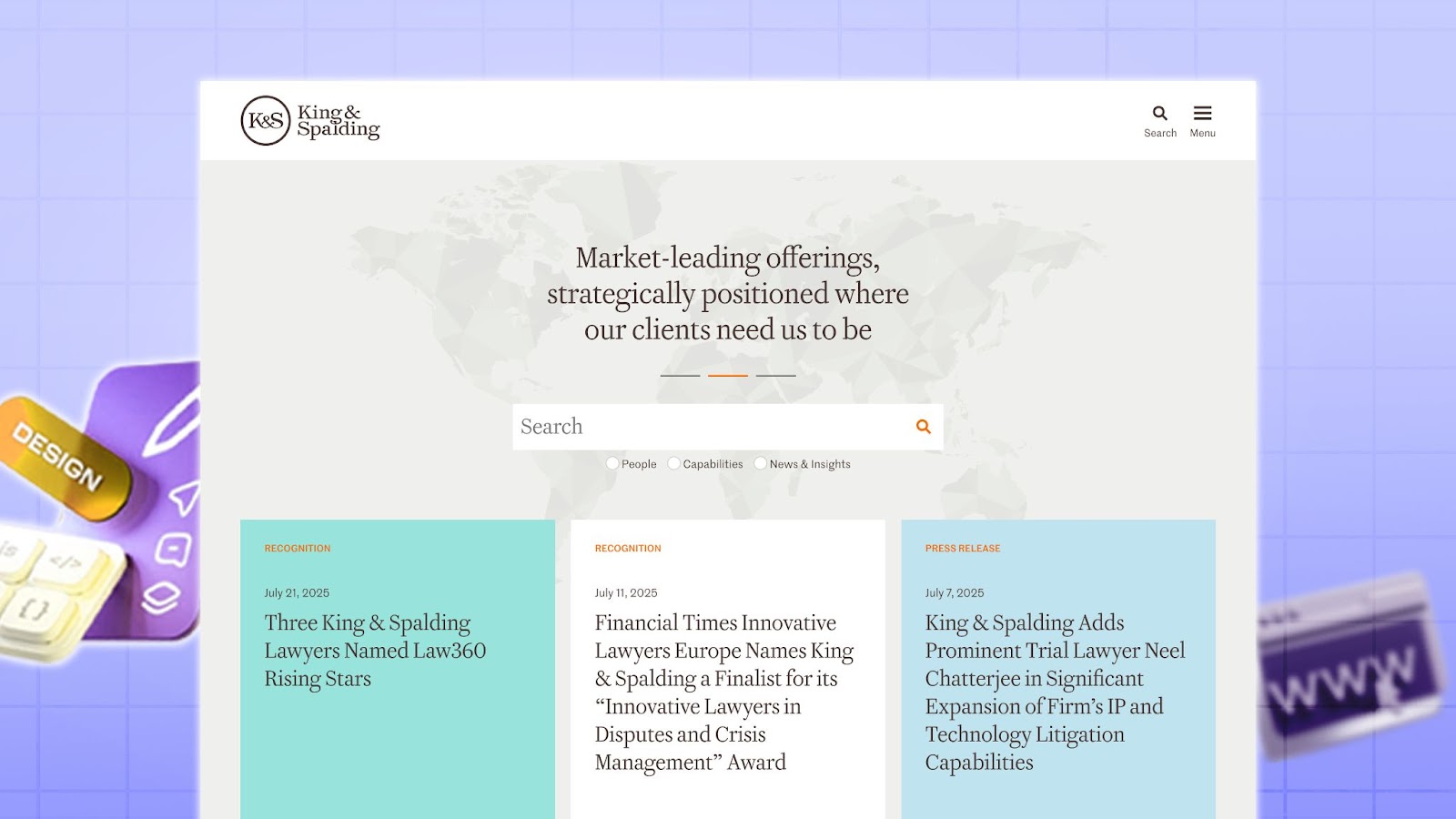
2. Alston & Bird LLP
Recognized for an inclusive culture, their site highlights firm expertise with a balance of corporate professionalism and approachable design. Clear practice area pages and an easy-to-navigate structure stand out.

3. Kilpatrick Townsend & Stockton LLP
This AmLaw 100 firm demonstrates how great law firm websites can balance dense legal content with user-friendly layouts. Practice areas are accessible within two clicks.

4. Smith, Gambrell & Russell LLP (SGR)
Their website reflects the firm’s long-standing legacy with a clean, traditional design—structured navigation, muted professional colors, and clear practice area breakdowns. The design emphasizes trust, authority, and heritage, aligning with their reputation as one of Atlanta’s most established law firms.

5. Troutman Pepper
Formerly Troutman Sanders, their redesigned site integrates modern legal website design trends: intake-first CTAs, responsive layouts, and attorney bios optimized for search engine visibility.
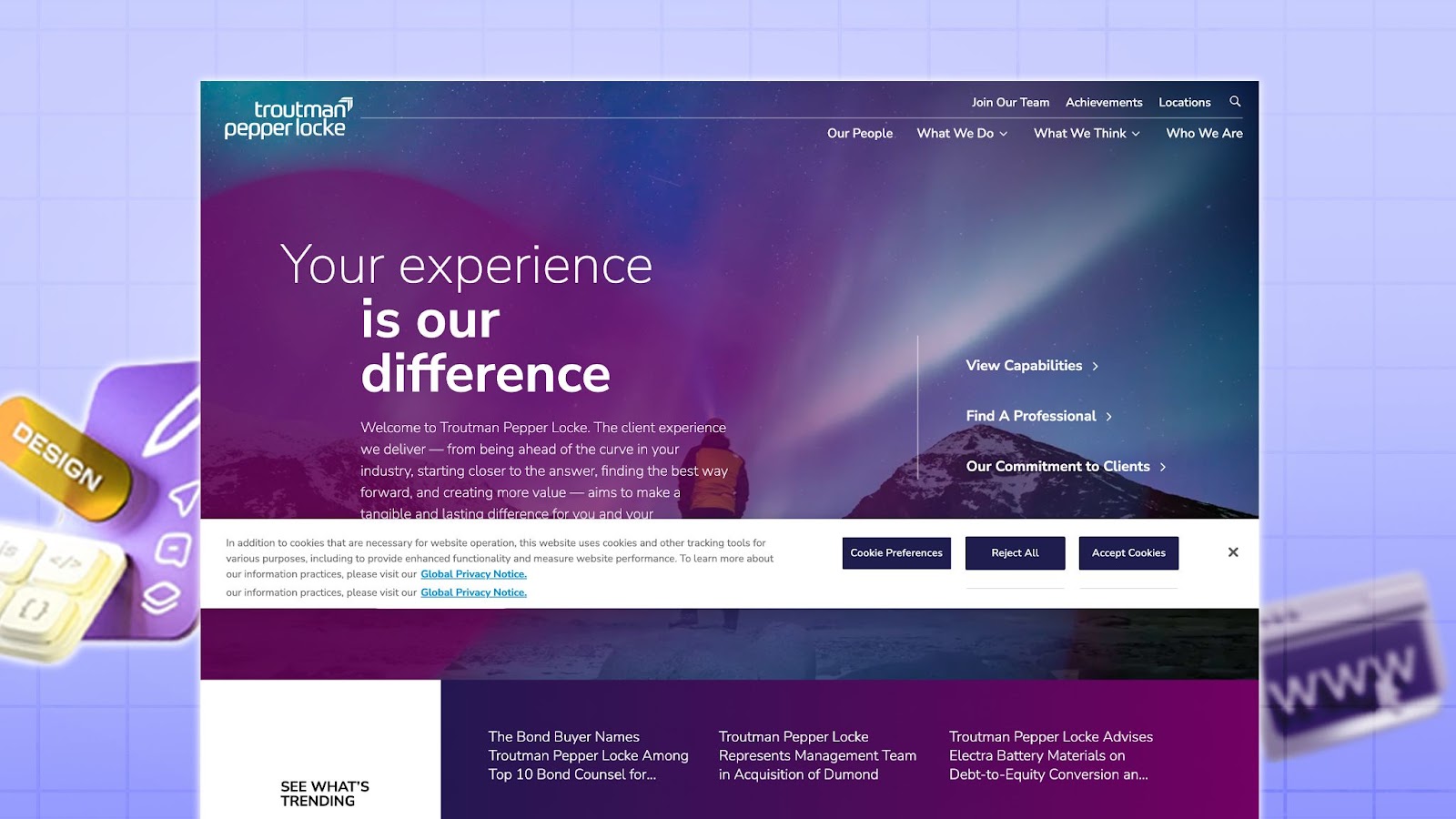
[[inner-cta]]
Elevate Your Atlanta Law Firm with Modern Web Design
Now, you've the golden tricks along with the best web design trending opportunity and inspiration to work with.
So, what's the next step?
Hiring an Atlanta-based law firm web design service can make the new website or redesign right!
Consider these advantages of Atlanta-based services:
- Deep understanding of local culture and trends
- Easier collaboration and communication
- Customized solutions to meet local needs
- Face-to-face meetings for more personalized service.
You can choose LegalPeel as our law firm web design agency launches hundreds of lawyer websites blending SEO, branding, UI/UX trends that keep earning cases and ROI. Schedule a meeting to see how we can help you
[[last-cta]]
Have Questions? We’ve Got Clear Answers.
That’s why our process is built to be clear, practical, and low-pressure, so you always understand what you’re getting and why it matters.
Let’s talk — no pressure.
We publish content focused on law firm growth, branding, SEO, website design, marketing funnels, and digital tools for attorneys. Every article is written to give lawyers practical steps to attract more clients.
Our content is created by the LegalPeel team of designers, SEO specialists, and writers who specialize in the legal industry. We also feature insights from attorneys and industry experts.
We aim to release weekly updates, covering trending topics and evergreen strategies that law firms can use to stay competitive online.
Because it’s written specifically for law firms and attorneys, not generic businesses. Every post is tailored to legal industry challenges — from compliance-friendly marketing to local SEO tips.
Yes! Many of our best articles come from reader suggestions. If you’d like us to cover a subject, you can reach out via our contact page.
Every post includes actionable tips, examples, and case studies. We don’t just talk about “best practices” — we show exactly how law firms can apply them.
No. While we’re based in Atlanta, the Journal is written for law firms nationwide. The insights apply whether you’re a solo attorney or a multi-location practice.


